英语专业四级考试(TEM4)新考纲(2016版)
2016年英语专业四级真题及答案解析
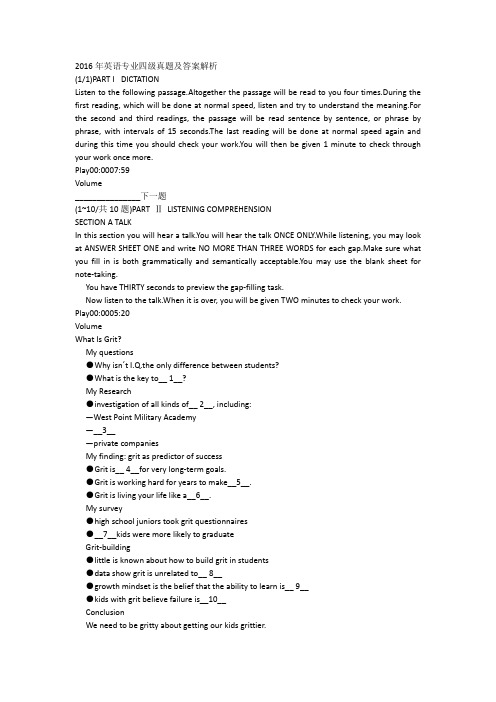
2016年英语专业四级真题及答案解析(1/1)PART I DICTATIONListen to the following passage.Altogether the passage will be read to you four times.During the first reading, which will be done at normal speed, listen and try to understand the meaning.For the second and third readings, the passage will be read sentence by sentence, or phrase by phrase, with intervals of 15 seconds.The last reading will be done at normal speed again and during this time you should check your work.You will then be given 1 minute to check through your work once more.Play00:0007:59Volume_______________下一题(1~10/共10题)PART ⅡLISTENING COMPREHENSIONSECTION A TALKIn this section you will hear a talk.You will hear the talk ONCE ONLY.While listening, you may look at ANSWER SHEET ONE and write NO MORE THAN THREE WORDS for each gap.Make sure what you fill in is both grammatically and semantically acceptable.You may use the blank sheet for note-taking.You have THIRTY seconds to preview the gap-filling task.Now listen to the talk.When it is over, you will be given TWO minutes to check your work. Play00:0005:20VolumeWhat Is Grit?My questions●Why isn´t I.Q.the only difference between students?●What is the key to__ 1__?My Research●investigation of all kinds of__ 2__, including:—West Point Military Academy—__3__—private companiesMy finding: grit as predictor of success●Grit is__ 4__for very long-term goals.●Grit is working hard for years to make__5__.●Grit is living your life like a__6__.My survey●high school juniors took grit questionnaires●__7__kids were more likely to graduateGrit-building●little is known about how to build grit in students●data show grit is unrelated to__ 8__●growth mindset is the belief that the ability to learn is__ 9__●kids with grit believe failure is__10__ConclusionWe need to be gritty about getting our kids grittier.第1题第2题第3题第4题第5题第6题第7题第8题第9题第10题上一题下一题(11~15/共10题)SECTION B CONVERSATIONSIn this section you will hear two conversations.At the end of each conversation, five questions will be asked about what was said.Both the conversation and the questions will be spoken ONCE ONLY.After each question there will be a ten-second pause.During the pause, you should read the four choices of A, B, C and D, and mark the best answer to each question on ANSWER SHEET TWO.You have THIRTY seconds to preview the questions.Now listen to the conversations.Play00:0003:33Volume第11题A.To tell the man that he has been shortlisted for interview.B.To ask the man a few questions about his interview.C.To explain to the man how to make a presentation.D.To tell the man the procedure of the interview.第12题A.Questions related to the job.B.General questions about himself.C.Specific questions about his CV.D.Questions about his future plan.第13题A.Questions from the interviewers.B.Questions from the interviewee.C.Presentation from the interviewee.D.Requests from the interviewee.第14题cational and professional background.B.Problems he has faced and solved.C.Major successes in his career so far.pany future and his contribution.第15题A.11 a.m., next Tuesday.B.11 a.m., next Thursday.C.9 a.m., this Tuesday.D.9 a.m., this Thursday.上一题下一题(16~20/共10题)SECTION B CONVERSATIONSIn this section you will hear two conversations.At the end of each conversation, five questions will be asked about what was said.Both the conversation and the questions will be spoken ONCE ONLY.After each question there will be a ten-second pause.During the pause, you should read the four choices of A, B, C and D, and mark the best answer to each question on ANSWER SHEET TWO.You have THIRTY seconds to preview the questions.Now listen to the conversations.Play00:0004:32Volume第16题A.The disadvantages of college loans.ernment financing in college education.C.How to handle the problem of college loans.D.How college students pay for their education.第17题A.It has increased by 6 to 8%.B.It has increased by 8 to 10%.C.It has decreased by 6 to 8%.D.It has decreased by 8 to 10%.第18题A.Student´s family income.B.First year salary after graduation.C.A fixed amount of 30,000 dollars.D.Payment in the next ten years.第19题A.Students can borrow money first.B.Students pay no tax on savings.C.Students pay less tax after graduation.D.Students withdraw without paying tax.第20题A.Giving up charitable or volunteer work.B.Neglecting their study at college.C.Giving up further education.D.Neglecting high salary in job-seeking.上一题下一题(1/20)PART ⅢLANGUAGE KNOWLEDGEThere are twenty sentences in this section.Beneath each sentence there are four words or phrases marked A, B, C and D.Choose one word or phrase that best completes the sentence.第21题How can I concentrate if you ______ continually ______ me with silly questions?A.have...interruptedB.are...interruptedC.had...interruptingD.were...interrupting上一题下一题(2/20)PART ⅢLANGUAGE KNOWLEDGEThere are twenty sentences in this section.Beneath each sentence there are four words or phrases marked A, B, C and D.Choose one word or phrase that best completes the sentence.第22题Among the four sentences below, Sentence ______ expresses the highest degree of possibility.A.It may take a long time to find a solution to the problem.B.It might take a long time to find a solution to the problem.C.It could take a long time to find a solution to the problem.D.It should take a long time to find a solution to the problem.上一题下一题(3/20)PART ⅢLANGUAGE KNOWLEDGEThere are twenty sentences in this section.Beneath each sentence there are four words or phrases marked A, B, C and D.Choose one word or phrase that best completes the sentence.第23题She is a better speaker than ______ in the class.A.any boyB.the other boysC.other any girlD.all the girls上一题下一题(4/20)PART ⅢLANGUAGE KNOWLEDGEThere are twenty sentences in this section.Beneath each sentence there are four words or phrases marked A, B, C and D.Choose one word or phrase that best completes the sentence.第24题Nobody heard him sing, ______.A.did oneB.did heC.didn´t theyD.did they上一题下一题(5/20)PART ⅢLANGUAGE KNOWLEDGEThere are twenty sentences in this section.Beneath each sentence there are four words or phrases marked A, B, C and D.Choose one word or phrase that best completes the sentence.第25题I can´t put up with ______.A.that friend of youB.that friend of yoursC.the friend of youD.the friend of yours上一题下一题(6/20)PART ⅢLANGUAGE KNOWLEDGEThere are twenty sentences in this section.Beneath each sentence there are four words or phrases marked A, B, C and D.Choose one word or phrase that best completes the sentence.第26题There has been an increasing number of ______ in primary schools in the past few years.A.man teacherB.men teacherC.man teachersD.men teachers上一题下一题(7/20)PART ⅢLANGUAGE KNOWLEDGEThere are twenty sentences in this section.Beneath each sentence there are four words or phrases marked A, B, C and D.Choose one word or phrase that best completes the sentence.第27题This is one of the issues that deserve ______.A.being mentionedB.mentioningC.to mentionD.for mention上一题下一题(8/20)PART ⅢLANGUAGE KNOWLEDGEThere are twenty sentences in this section.Beneath each sentence there are four words or phrases marked A, B, C and D.Choose one word or phrase that best completes the sentence.第28题The audience ______ excited on seeing ______ favorite star glide onto the stage.A.were...theirB.were...itsC.was...theirD.was...one´s上一题下一题(9/20)PART ⅢLANGUAGE KNOWLEDGEThere are twenty sentences in this section.Beneath each sentence there are four words or phrases marked A, B, C and D.Choose one word or phrase that best completes the sentence.第29题______ your advice, I would have made the wrong decision.A.Hadn´t it been forB.Had it not been forC.Had it been forD.Had not it been for上一题下一题(10/20)PART ⅢLANGUAGE KNOWLEDGEThere are twenty sentences in this section.Beneath each sentence there are four words or phrases marked A, B, C and D.Choose one word or phrase that best completes the sentence.第30题The sentence I wish I had been more careful in spending money expresses the speaker´s ______.A.hopeB.joyC.regretD.relief上一题下一题(11/20)PART ⅢLANGUAGE KNOWLEDGEThere are twenty sentences in this section.Beneath each sentence there are four words or phrases marked A, B, C and D.Choose one word or phrase that best completes the sentence.第31题The Attorney General ordered a federal autopsy of Brown´s body, seeking to ______ the family and community there would be a thorough investigation into his death.A.ensureB.insureC.assureD.ascertain上一题下一题(12/20)PART ⅢLANGUAGE KNOWLEDGEThere are twenty sentences in this section.Beneath each sentence there are four words or phrases marked A, B, C and D.Choose one word or phrase that best completes the sentence.第32题The police department came under strong criticism for both the death of an unarmed man and its handling of the ______.A.consequenceB.outcomeC.resultD.aftermath上一题下一题(13/20)PART ⅢLANGUAGE KNOWLEDGEThere are twenty sentences in this section.Beneath each sentence there are four words or phrases marked A, B, C and D.Choose one word or phrase that best completes the sentence.第33题The Foreign Secretary tried to ______ doubts about his handling of the crisis.A.dispelB.expelC.repelD.quell上一题下一题(14/20)PART ⅢLANGUAGE KNOWLEDGEThere are twenty sentences in this section.Beneath each sentence there are four words or phrases marked A, B, C and D.Choose one word or phrase that best completes the sentence.第34题Mutual funds are thus best for investors who don´t want to take the time to study stocks in detailor who ______ the resources to build a portfolio.A.depriveckC.yearnD.attain上一题下一题(15/20)PART ⅢLANGUAGE KNOWLEDGEThere are twenty sentences in this section.Beneath each sentence there are four words or phrases marked A, B, C and D.Choose one word or phrase that best completes the sentence.第35题Chris ran ______ John at a sporting-goods trade show and the two quickly struck ______ an easy rapport.A.into...upB.on...intoC.across...onD.against...into上一题下一题(16/20)PART ⅢLANGUAGE KNOWLEDGEThere are twenty sentences in this section.Beneath each sentence there are four words or phrases marked A, B, C and D.Choose one word or phrase that best completes the sentence.第36题"I am leaving the country soon," he told a ______ convened group of reporters.A.especiallyB.particularlyC.speciallyD.specifically上一题下一题(17/20)PART ⅢLANGUAGE KNOWLEDGEThere are twenty sentences in this section.Beneath each sentence there are four words or phrases marked A, B, C and D.Choose one word or phrase that best completes the sentence.第37题Israel and Hamas had reached a deal on extending the ______ ceasefire by an extra 24 hours until Tuesday at midnight.A.contemporaryB.makeshiftC.spontaneousD.temporary上一题下一题(18/20)PART ⅢLANGUAGE KNOWLEDGEThere are twenty sentences in this section.Beneath each sentence there are four words or phrases marked A, B, C and D.Choose one word or phrase that best completes the sentence.第38题______ to unplugging the alarm clock and trusting your ability to wake on time on your own, you should probably ease yourself into the new arrangement by keeping a very regular schedule forseveral weeks.A.DueB.PriorC.RelatedD.Thanks上一题下一题(19/20)PART ⅢLANGUAGE KNOWLEDGEThere are twenty sentences in this section.Beneath each sentence there are four words or phrases marked A, B, C and D.Choose one word or phrase that best completes the sentence.第39题If you are an athlete, strong abdominal muscles help you ensure a strong back and freedom from injury during ______ upper-body movement.A.valiantB.variableC.vigilantD.vigorous上一题下一题(20/20)PART ⅢLANGUAGE KNOWLEDGEThere are twenty sentences in this section.Beneath each sentence there are four words or phrases marked A, B, C and D.Choose one word or phrase that best completes the sentence.第40题Finning is a cruel ______ in which the shark´s fins are lopped off, and the live shark is thrown back to sea.A.realityB.truthC.practiceD.skill上一题下一题Imagine a world without writing.Obviously there would be no books: no novels, no encyclopedias, no cookbooks, no textbooks, no telephone books, no scriptures, no diaries, no travel guides.There would be no ball-points, no typewriters, no computers, no Internet, no magazines, no movie credits, no shopping lists, no newspapers, no tax returns.But such__41__of objects almost miss the point.The world we live in has been indelibly marked by the written word,__42__by the technology of writing over thousands of years.Ancient kings proclaimed their authority and__43__their laws in writing.Scribes administered great empires by writing, their knowledge of recording and retrieving information essential to governing complex societies.Religious traditions were passed on through__44__, and spread to others, in writing.Scientific and technological progress was achieved and__ 45__through writing.Accounts in trade and commerce could be kept because of writing.Nearly every step of civilization has been mediated through writing.A world without writing would bear__46__resemblance to the one we now live in.Writing is a__47__necessity to the societies anthropologists call civilizations.A civilization is distinguished from other societies by the complexity of its social organization, by its construction of cities and large public buildings, and by the economic specialization of its members, many of whom are not__48__involved in food procurement or production.Acivilization, with its taxation and tribute systems, its trade and its public works, requires a__49__system of record keeping.And so the early civilizations of Egypt, China, and (probably) India all developed a system of writing.Only the Peruvian civilization of the Incas and their predecessors did not use writing but__50__invented a system of keeping records on knotted color-coded strings known as quipu.A.amplebinationsC.directlyD.disseminatedE.generationsF.genuinelyG.insteadH.listsI.promulgatedJ.publicizedK.scantL.shapedM.sophisticatedN.transplantedO.virtual第41题:请选择binationsC.directlyD.disseminatedE.generationsF.genuinelyG.insteadH.listsI.promu lgatedJ.publicizedK.scantL.shapedM.sophisticatedN.transplantedO.virtual第43题:请选择binationsC.directlyD.disseminatedE.generationsF.genuinelyG.insteadH.listsI.promu lgatedJ.publicizedK.scantL.shapedM.sophisticatedN.transplantedO.virtual第45题:请选择binationsC.directlyD.disseminatedE.generationsF.genuinelyG.insteadH.listsI.promu lgatedJ.publicizedK.scantL.shapedM.sophisticatedN.transplantedO.virtual第47题:请选择binationsC.directlyD.disseminatedE.generationsF.genuinelyG.insteadH.listsI.promu lgatedJ.publicizedK.scantL.shapedM.sophisticatedN.transplantedO.virtual第49题:请选择binationsC.directlyD.disseminatedE.generationsF.genuinelyG.insteadH.listsI.promu lgatedJ.publicizedK.scantL.shapedM.sophisticatedN.transplantedO.virtual上一题下一题(51~60/共10题)PART ⅤREADING COMPREHENSIONSECTION A MULTIPLE-CHOICE QUESTIONSIn this section there are three passages followed by ten multiple-choice questions.For each multiple-choice question, there are four suggested answers marked A, B, C and D.Choose the one that you think is the best answer and mark your answers on ANSWER SHEET TWO.When I was twenty-seven years old, I was a mining-broker´s clerk in San Francisco, and an expert in all the details of stock traffic.I was alone in the world, and had nothing to depend upon but my wits and a clean reputation; but these were setting my feet in the road to eventual fortune, and I was content with the prospect.My time was my own after the afternoon board, Saturdays, and I was accustomed to putting it in on a little sail-boat on the bay.One day I ventured too far, and was carried out to sea.Just at nightfall, when hope was about gone, I was picked up by a small ship which was bound for London.It was a long and stormy voyage, and they made me work my passage without pay, as a common sailor.When I stepped ashore in London my clothes were ragged and shabby, and I had only a dollar in my pocket.This money fed and sheltered me twenty-four hours.During the next twenty-four I went without food and shelter.About ten o´clock on the following morning, dirty and hungry, I was dragging myself along Portland Place, when a child that was passing, towed by a nurse-maid, tossed a big pear—minus one bite—into the gutter.I stopped, of course, and fastened my desiring eye on that muddy treasure.My mouth watered for it, my stomach craved it, my whole being begged for it.But every time I made a move to get it some passing eye detected my purpose, and of course I straightened up then, and looked indifferent and pretended that I hadn´t been thinking about the pear atall.This same thing kept happening and happening, and I couldn´t get the pear.I was just getting desperate enough to brave all the shame, and to seize it, when a window behind me was raised, and a gentleman spoke out of it, saying: "Step in here, please."I was admitted by a man servant, and shown into a sumptuous room where a couple of elderly gentlemen were sitting.They sent away the servant, and made me sit down.They had just finished their breakfast, and the sight of the remains of it almost overpowered me.I could hardly keep my wits together in the presence of that food, but as I was not asked to sample it, I had to bear my trouble as best as I could.Now, something had been happening there a little before, which I did not know anything about until a good many days afterwards, but I will tell you about it now.Those two old brothers had been having a pretty hot argument a couple of days before, and had ended by agreeing to decide it by a bet, which is the English way of settling everything.You will remember that the Bank of England once issued two notes of a million pounds each, to be used for a special purpose connected with some public transaction with a foreign country.For some reason or other only one of these had been used and canceled; the other still lay in the vaults of the Bank.Well, the brothers chatting along, happened to get to wondering what might be the fate of a perfectly honest and intelligent stranger who should be turned adrift in London without a friend, and with no money but that million-pound bank-note, and no way to account for his being in possession of it.Brother A said he would starve to death; Brother B said he wouldn´t.Brother A said he couldn´t offer it at a bank or anywhere else, because he would be arrested on the spot.So they went on disputing till Brother B said he would bet twenty thousand pounds that the man would live thirty days, anyway, on that million, and keep out of jail, too.Brother A look him up.Brother B went down to the Bank and bought that note.Then he dictated a letter, which one of his clerks wrote out a beautiful round hand, and then the two brothers sat at the window a whole day watching for the right man to give it to.I finally became the pick of them.PASSAGE TWOThe concept of peace is a very important one in cultures all over the world.Think about how we greet people.In some languages, the phrases for greetings contain the word for peace.In some cultures we greet people by shaking hands or with another gesture to show that we are not carrying weapons—that we come in peace.And there are certain symbols which people in very different cultures recognize as representing peace.Let´s look at a few of them.The doveThe dove has been a symbol of peace and innocence for thousands of years in many different cultures.In ancient Greek mythology it was a symbol of love and the renewal of life.In ancient Japan a dove carrying a sword symbolized the end of war.There was a tradition in Europe that if a dove flew around a house where someone was dying then their soul would be at peace.And there are legends which say that the devil can turn himself into any bird except for a dove.In Christian art, the dove was used to symbolize the Holy Ghost and was often painted above Christ´s head.But it was Pablo Picasso who made the dove a modem symbol of peace when he used it on a poster for the World Peace Congress in 1949.The rainbowThe rainbow is another ancient and universal symbol, often representing the connection。
专四2016年英语专业四级真题和答案
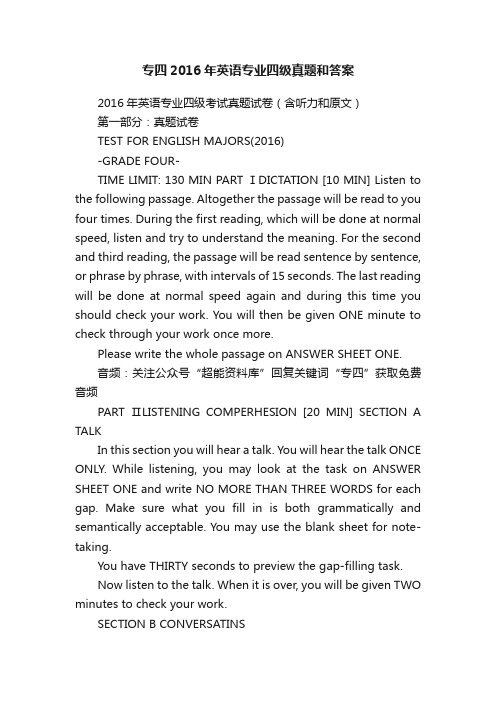
专四2016年英语专业四级真题和答案2016年英语专业四级考试真题试卷(含听力和原文)第一部分:真题试卷TEST FOR ENGLISH MAJORS(2016)-GRADE FOUR-TIME LIMIT: 130 MIN PART ⅠDICTATION [10 MIN] Listen to the following passage. Altogether the passage will be read to you four times. During the first reading, which will be done at normal speed, listen and try to understand the meaning. For the second and third reading, the passage will be read sentence by sentence, or phrase by phrase, with intervals of 15 seconds. The last reading will be done at normal speed again and during this time you should check your work. You will then be given ONE minute to check through your work once more.Please write the whole passage on ANSWER SHEET ONE.音频:关注公众号“超能资料库”回复关键词“专四”获取免费音频PART ⅡLISTENING COMPERHESION [20 MIN] SECTION A TALKIn this section you will hear a talk. You will hear the talk ONCE ONLY. While listening, you may look at the task on ANSWER SHEET ONE and write NO MORE THAN THREE WORDS for each gap. Make sure what you fill in is both grammatically and semantically acceptable. You may use the blank sheet for note-taking.You have THIRTY seconds to preview the gap-filling task.Now listen to the talk. When it is over, you will be given TWO minutes to check your work.SECTION B CONVERSATINSIn this section you will hear two conversations. At the end of each conversation, five questions will be asked about what was said. Both the conversations and the questions will be spoken ONCE ONLY. After each question there will be a ten-second pause. During the pause, you should read the four choices of [A], [B], [C] and [D], and mark the best answer to each question on ANSWER SHEET TWO.You have THIRTY seconds to preview the questions.Now listen to the conversations.Conversation One1.[A] To tell the man that he has been shortlisted for interview.[B]To ask the man a few questions about his interview.[C]To explain to the man how to make a presentation.[D]T o tell the man the procedure of the interview.2.[A] Questions related to the job.[B]General questions about himself.[C]Specific questions about his CV.[D]Questions about his future plan.3.[A] Questions from the interviewers.[B]Questions from the interviewee.[C]Presentation from the interviewee.[D]Requests from the interviewee.4.[A] Educational and professional background.[B]Problems be has faced and solved.[C]Major successes in his career so far.[D]Company future and his contribution.5.[A] 11 a. m., next Tuesday. [B] 11 a. m., next Thursday.[C] 9 a. m., this Tuesday. [D] 9 a. m., this Thursday.Conversation Two6.[A] The disadvantages of college loans.[B]Government financing in college education.[C]How to handle the problem of college loans.[D]How college students pay for their education.7.[A] It has increased by 6 to 8%.[B]It has increased by 8 to 10%.[C]It has decreased by 6 to 8%.[D]It has decreased by 8 to 10%.8.[A] Student’s family income.[B]First year salary after graduation.[C]A fixed amount of 30,000 dollars.[D]Payment in the next ten years.9.[A] Students can borrow money first.[B]Students pay no tax on savings.[C]Students pay less tax after graduation.[D]Students withdraw without paying tax.10.[A] Giving up charitable or volunteer work.[B]Neglecting their study at college.[C]Giving up further education.[D]Neglecting high salary in job-seeking.PART ⅢLANGUAGE USAGE [10 MIN] There are twenty sentences in this section. Beneath each sentence there are four options marked [A]. [B], [C] and [D]. Choose one word phrase that best completes the sentence.Mark your answers on ANSWER SHEET TWO.11.How can I concentrate if you continually me with silly questions?[A] have… interrupted [B] had… inter rupted[C] are… interrupting[D] were… interrupting12.A mong the four sentences below, Sentence express the highest degree of possibility.[A]It may take a long time to find a solution to the problem.[B]It might take a long time to find a solution to the problem.[C]It could take a long time to find a solution to the problem.[D]It should take a long time to find a solution to the problem.13.She is a better speaker than in the class.[A] any boy [B] the other boys [C] other any girl [D] all the girls14.Nobody heard him sing, ?[A] did one [B] did he [C] didn’t they [D] did they15.I can’t put up with .[A]that friend of you [B] that friend of yours[C] the friend of you [D] the friend of yours16.There has been an increasing number of in primary schools in past few years.[A]man teacher [B] men teacher [C] man teachers [D] men teachers17.This is one of the issues that deserve .[A] being mentioned [B] mentioning [C] to mention [D] for mention18.The audience excited on seeing favorite star glide onto the stage.[A] were… their [B] were… its [C] was… their [D] was… one’s19. your advice, I would have made the wrong decision.A. ample F. genuinely K. scantB. combinationsG. insteadL. shapedC. directlyD. disseminatedH. lists I. promulgatedM. sophisticated N. transplantedE. generationsJ. publicizedO. virtual[A] Hadn’t it been for [B] Had it not been for[C] Had it been for [D] Had not it been for20.The sentence I wish I had been more careful in spending money express the speaker’s.[A]hope [B] joy [C] regret [D] relief21.T he Attorney General ordered a federal autopsy of Brown’s body, seeking to the family and community there would be a thorough investigation into his death.[A]ensure [B] insure [C] assure [D] ascertain22.T he police department came under strong criticism for both the death of an unarmed and its handling of the .[A]consequence [B] outcome [C] result [D] aftermath23.The Foreign Secretary tried to doubts about his handling of the crisis.[A] dispel [B] expel [C] repel [D] quell24.Mutual funds are thus best for investors who don’t want to take the time to study stocks in detail or whothe resources to build a portfolio.[A]deprive [B] lack [C] yearn [D] attain25.Chris ran John at a sporting-goods trade show and the two quickly struck an easy rapport.[A]into…up[B] on…into[C] across…on[D] against…into26.“I’m leaving the country soon,” he told a convened group of reporters.[A] especially [B] particularly [C] specially [D] specifically27.Israel and Hamas had reached a deal on extending the ceasefire by an extra 24 hours until Tuesday at midnight.[A]contemporary [B] makeshift [C] spontaneous [D] temporary28.to unplugging the alarm clock and trusting your ability to wake on time on your own, you should probably ease yourself into the new arrangement by keeping a very regular schedule for several weeks.[A]Due [B] Prior [C] Related [D] Thanks29.I f you are an athlete, strong abdominal muscles help you ensure a strong back and freedom from injury during upper-body movement.[A]valiant [B] variable [C] vigilant [D] vigorous30.F inning is a cruel in which the shark’s fins are lopped off, and the live shark is thrown back to sea.[A]reality [B] truth [C] practice [D] skillPART ⅣCLOZE [10 MIN] Decide which of the words given in the box below would best complete the passage if inserted in the corresponding blank. The words can be used ONCE ONLY. Mark the letter for each word on ANSWER SHEET TWO.Imagine a world without writing. Obviously there would be no books: no novels, no encyclopedias, no cookbooks, no textbooks, no telephone books, no scriptures, no diaries, no travel guides. There would be no ball-points, no typewriters, no computers, no Internet, no magazines, no movie credits, no shopping lists, no newspapers, no tax returns. But such (31) of subjects almost miss the point. The world we live in has been indelibly marked by the written word, (32) by the technology of writing over thousands of years. Ancient kingsproclaimed their authority and (33) their laws in writing. Scribes administered great empires by writing, their knowledge of recording and retrieving information essential to governing complex societies. Religious traditions were passed on through (34) , and spread to others, in writing. Scientific and technological progress was achieved and (35) through writing. Accounts in trade and commerce could be kept because of writing. Nearly every step of civilization has been mediated through writing. A world without writing would bear (36) resemblance to the one we now live in. Writing is a (37) necessity to the societies anthropologists call civilizations. A civilization is distinguished from other societies by the complexity of its social organization, by its construction of cities and large public buildings, and by the economic specialization of its members, many of whom are not (38) involved in food procurement or production. A civilization, with its taxation and tribute systems, its trade and its public works, requires a (39) system of record keeping. And so the early civilizations of Egypt, China, and (probably) India all developed a system of writing. Only the Peruvian civilization of the Incas and their predecessors did not use writing but (40) invented a system of keeping records on knotted color-coded strings known as quipu.PART ⅤREADING COMPREHENSION [35MIN] SECTION A MULTIPLE CHOICE QUESTIONSIn this section there are three passages followed by ten multiple choice questions. For each multiple choice question, there are four suggested answers marked [A], [B], [C] and [D]. Choose the one that you think is the best answer and mark your answers on ANSWER SHEET TWO.PASSAGE ONE(1)When I was twenty-seven years old, I was a mining-broker’s cle rk in San Francisco, and an expert in all the details of stock traffic. I was alone in the world, and had nothing to depend upon but my wits and a clean reputation; but these were setting my feet in the road to eventual fortune, and I was content with the prospect. My time was my own after the afternoon board, Saturdays, and I was accustomed to putting it in on a little sail-boat on the bay. One day I ventured too far, and was carried out to sea. Just at nightfall, when hope was about gone, I was picked up by a small ship which was bound for London. It was a long and stormy voyage, and they made me work my passage without pay, as a common sailor. When I stepped ashore in London my clothes were ragged and shabby, and I had only a dollar in my pocket. This money fed and sheltered me twenty-four hours. During the next twenty-four I went without food and shelter.(2)About ten o’clock on the following morning, dirty and hungry, I was dragging myself along Portland Place, when a child that was passing, towed by a nurse-maid, tossed a big pear—minus one bite—into the gutter. I stopped, of course, and fastened my desiring eye on that muddy treasure. My mouth watered for it, my stomach craved it, my whole being begged for it. But every time I made a move to get it some passing eye detected my purpose, and of course I straightened up then, and looked ind ifferent and pretended that I hadn’t been thinking about the pear at all. This same thing kept happening and happening, and I couldn’t get the pear.(3)I was just getting desperate enough to brave all the shame, and to seize it, when a window behind me was raised, and a gentleman spoke out of it, saying: “ Step in here,please.”(4)I was admitted by a man servant, and shown into a sumptuous room where a couple of elderly gentlemen were sitting. They sent away the servant, and made me sit down. They had just finished their breakfast, and the sight of the remains of it almost overpowered me. I could hardly keep my wits together in the presence of that food, but as I was not asked to sample it,I had to bear my trouble as best as I could.(5)Now, something had been happening there a little before, which I did not know anything about until a good many days afterwards, but I will tell you about it now. Those two old brothers had been having a pretty hot argument a couple of days before, and had ended by agreeing to decide it by a bet, which is the English way ofsettling everything.(6)You will remember that the Bank of England once issued two notes of a million pounds each, to be used for a special purpose connected with some public transaction with a foreign country. For some reason or other only one of these had been used and canceled; the other still lay in the vaults of the Bank. Well, the brothers chatting along, happened to get to wondering what might be the fate of a perfectly honest and intelligent stranger who should be turned adrift in London without a friend, and with no money but that million-pound bank-note, and no way to account for his being in possession of it. Brother A said he would starve to death; Brother B said he wouldn’t. Brother A said he coul dn’t offer it at a bank or anywhere else, because he would be arrested on t he spot. So they went on disputing till Brother B said he would bet twenty thousand pounds that the man would live thirty days, anyway, on that million, and keep out of jail, too. Brother A took him up. Brother B went down to theBank and bought that note. Then he dictated a letter, which one of his clerks wrote out in a beautiful round hand, and then the two brothers sat at the window a whole day watching for the right man to give it to.(7)I finally became the pick of them.41.In Para. 1, the phrase “set my feet” probably means .A. put me asideB. prepare meC. let me walkD. start my journey42.It can be concluded from Para. 2 that .A.the man wanted to maintain dignity though starvedB.the man could not get a proper chance to eat the pearC.the man did not really want the pear since it was dirtyD.it was very difficult for the man to get the pear/doc/5615631332.html,pared with Brother A, Brother B was more towards the effect of the one-million-pound bank-note on a total strange.A.neutralB. negativeC. reservedD. positivePASSAGE TWO(1)The concept of peace is a very important one in cultures all over the world. Think about how we greet people. In some language, the phrases for greetings contain the word for peace. In some cultures we greet people by shaking hands or with another gesture to show that we are not carrying weapons —that we come in peace. And there are certain symbols which people in very different cu ltures recognize as representing peace. Let’slook at a few of them.The dove(2)The dove has been a symbol of peace and innocence for thousands of years in many different cultures. In ancient Greek mythology it was a symbol of love and the renewal of life. In ancient Japan a dove carrying a sword symbolized the end of war.(3)There was a tradition in Europe that if dove flew around a house where someone was dying then their soul would be at peace. And there are legends which say that devil can turn himself into any bird except for a dove. In Christian art, the dove was used to symbolized the Holy Ghost and was often p ainted above Christ’s head.(4)But it was Pablo Picasso who made the dove a modern symbol of peace when he used it on a poster for the World Peace Congress in 1949.The rainbow(5)The rainbow is another ancient and universal symbol, often representing the connection between human beings and their gods. In Greek mythology it was associated with Iris, the goddess who brought messages from the gods on Mount Olympus. In Scandinavian mythology the rainbow was a bridge between the gods and the earth. In the Bible a rainbow showed Noah that the Biblical flood was finally over, and that God had forgiven his people. In the Chinese tradition, the rainbow is a common symbol for marriage because the colours represent the union of yin and yang. Nowadays the rainbow is used by many popular movements for peace and the environment, representingthe possibility of a better world in the future and promising sunshine after rain.Mistletoe(6)This plant was sacred in many cultures, generally representing peace and love. Most people know of the tradition of kissing under the mistletoe at Christmas time, which probably comes from Scandinavian mythology. The goddess Freya’s son was killed by an arrow made of mistletoe, so, in honour of him, she declared that it would always be a symbol of peace. It was often hung in doorways as a sign of friendship.(7)The ancient Druids believed that hanging mistletoe in your doorway could protect you from evil spirits. Tribes would stop fighting for a period of time if they found a tree with mistletoe. But you will never see mistletoe in a Christian church —it is banned because of its associations with pagan religion and superstition.The olive branch(8)The olive tree has always been a valuable source of food and oil. In Greek mythology, the goddess Athena gave the olive tree to the people of Athens, who showed their gratitude by naming the city after her. But no one knows for sure when or why it began to symbolize peace. There is probably a connection with ancient Greece. Wars between states were suspended during the Olympics Games, and the winners were given crowns of olive branches. The symbolism may come from the fact that the olive tree takes a long time to produce fruit, so olives could only be cultivated successfully in long periods of peace. Whatever the history, the olive branch is a part of many modern flags symbolizing peace and unity. One well-known example is the United Nations symbol.The ankh(9)The ankh is an ancient symbol which was adopted by thehippie movement in the 1960s to represent peace and love. It was found in many Asian cultures, but is generally associated with ancient Egypt. It represented life and immortality. Egyptians were buried with an ankh, so that they could continue to live in the “afterworld”. The symbol was also found alon g the sides of the Nile, which gave life to the people. They believed that the ankh could control the flow of the river and make sure that there was always enough water.44.Which of the following is the best title for the passage?A.Concept of Peace.B. Popular Peace Symbols.C. Origin of Peace Symbols.D. Cultural Difference of Peace.45.The rainbow represents the connection between human beings and their gods in all the following countries EXCEPT .A.SwedenB. GreeceC. FinlandD. China46.In North Europe mistletoe was often hung in doorways to indicate .A.friendshipB. loveC. kinshipD. honour47.The origin of the ankh can date back to .A.the NileB. the “afterword”C. the hippie movementD. ancient EgyptPASSAGE THREE(1)Two sides almost never change: That you can manipulate people into self-sufficiency and that you can punish them into good citizenship.(2)The first manifests itself in our tireless search for the magical level at which welfare grants are big enough to meet basic needs but small enough to make low-paid work attractive. The second has us looking to the criminal justice system to cure behavior that is as much as anything the result of despair.(3)The welfare example is well known. We don’t want poor people to live in squalor or their children to be malnourished. But we also don’t want to subsidize the indolence of people who are too lazy to work. The first impulse leads us to provide housing, food stamps, medical care and a cash stipend for families in need. The second gets us to think abo ut “workforce”.(4)We’ve been thinking about it for two reasons: the “nanny” pro blems of two high-ranking government officials (who hired undocumented foreigners as household helpers, presumably because they couldn’t findAmericans to do the work) and Pre sident Clinton’s proposal to put a two-year limit on welfare.(5)Maybe something useful will come of Clinton’s idea, but I’m not all that hopeful. It looks to me like one more example of trying to manipulate people into taking care of themselves.(6)On the criminal justice side, we hope to make punishment tough enough to discourage crime but not so tough as to clog our prisons with relatively minor offenders. Too short a sentence, we fear, will create contempt for the law. Too long a sentence will take up costly space better used for the violent and unremorseful.(7)Not only can we never find the “perfect” punishment,our search for optimum penalties is complicated by our desire for fairness: to let the punishment fit the crime. The problem is that almost any punishment—even the disgrace of being charged with a crime—is sufficient to deter the middle class, while for members of the underclass, probation may be translated as “I beat it”.(8)So how can you use the system —welfare or criminal justice —to produce the behavior we want? The answer, I suspect is: You can’t.(9)We keep trying to use welfare and prison to change people—to make them think and behave the way we do —when the truth is the incentives work only for those who already think the way we do: who view today’s action with an eye on the future.(10)We will take lowly work (if that is all that’s available) because we believe we can make bad jobs work for us. We avoid crime not because we are better people but because we see getting caught as a future-wrecking disaster. We are guided by a belief that good things will happen for us in the future if we take proper care of the present. Even under the worst of circumstances, we believe we are in control of our lives.(11)And we have trouble understanding that not everybody believes as we believe. The welfare rolls, the prison and the mean street of our cities are full of people who have given up on their future. Without hope for the future, hard work at a low-paid job makes no sense. Working hard in school, or pleasing a boss, or avoiding pregnancy makes no sense. The deadly disease is hopelessness. The lawlessness and poverty are only the obvious symptoms.(12)I’m not advocating that we stop looking for incentivesto move poor people toward self-sufficiency or that we stop punishing people for criminal behavior. There will always be some people who need help and some who deserve to be in jail.(13)All I’m saying is that the long-term answer both to welfare and the crime that plagues our communities is not to fine tune the welfare and criminal justice systems but to prevent our children from getting the disease of despair.(14)If we encourage our young people to believe in the future, and give them solid evidence for believing, we’ll find both crime and poverty shrinking to manag eable proportions.48.What is the author’s attitude towards Clinton’s proposal to welfare?A.Pessimistic.B. Optimistic.C. Suspicious.D. Sarcastic.49.It can be inferred from Para. 7 that optimum penalties are to the underclass.A.hopelessB. uselessC. frighteningD. humiliating50.Which of the following is the most appropriate title for the passage?A. Lawlessness and Poverty.B. Criminal Justice System.C. Welfare Grants.D. Disease of Despair.SECTION B SHORT ANSWER QUESTIONSIn this section there are five short answer questions based onthe passages in Section A. Answer the questions with NO more than TEN words in the space provided on ANSWER SHEET TWO.PASSAGE ONE51.In Para. 4, what does the man mean by saying “I had to bear my trouble”?52.What can be inferred from the last sentence of the passage?PASSAGE TWO53.Why does the UN use the olive branch in its symbol?PASSAGE THREE54.According to the author, what balance should we keep in welfare?55.What does the author mean b y saying “Even under the worst of circumstances, we believe we are in control of our lives” (Para.10)?PART ⅥWRITING [45MIN]Read carefully the following excerpt on term-time holiday arguments in the UK, and then write your response in NO LESS THAN 200 words, in which you should:summarize the main message of the excerpt, and thencomment on whether parents should take children out of school for holiday during term time in order to save money.You should support yourself with information from the excerpt.Marks will be awarded for content relevance, content sufficiency, organization and language quality. Failure to follow the above instructions may result in a loss of marks.Term-time holidays will be bannedParents are to be banned by Michael Gove, UK’s Edu cation Secretary, from taking their children out of school to save moneyon holidays.He is to abolish the right of head teacher to “authorise absence” from the classroom, which has been used to let families take term-time breaks, and will warn them they face fines for their children not being at school.“Any time out of school has the potential to damage a child’s education,” a senior source at the Department for Education said this weekend. “That is why the government will end the distinction between authorised and unauthorised absence.”“This is part of the government’s wider commitment to bring down truancy levels in our schools. There will also be stricter penalties for parents and schools.”The tough measures on truancy are part of a wider attempt by Mr. Gove to make education more academically rigorous and to tackle a cultu re in the educational establishment which he believes has accepted “excuses for failure”.Russell Hobby, the general secretary of the National Association of Head Teachers, said the measure would discourage parents from trying to put pressure on heads to sanction term-time holiday. “ The high cost of holidays outside of term time is still an issue but ultimately a child’s education is more important than a holiday,” he said.Write your response on ANSWER SHEET THREE.—THE END—PART ⅡLISTENING COMPRENSIONSECTION A TALK下列各题必须使用黑色字迹签字笔在答题区域内作答,超出红色矩形边框限定区域的答案无效。
英语专业四级考试大纲及重点

测试目的: 测试学生的理解和书写能力、拼写熟练程度以及标点符号的正确运用。 选材原则: (a)题材广泛,体裁多样。 (b)文章的语言难度以不超过教学大纲中的规定为准。 (c)文章长度约150词。
选材原则: (a)题材广泛,体裁多样,包括记叙文、说明文;议论文等。
• (c)文章的语言难度中等,所用词汇基本上不超出教学大纲词汇表对四级规定的范围。
• (d)快速阅读部分的材料与阅读理解部分的材料相仿,但相对容易些。体裁除上述之外 还可包括广告、说明书等
• Lecture two
• 听写
专四听力特点
III.听力理解 (PartIII: Listening Comprehension) 20分钟
• 测试要求: (a)能听懂英语国家人士关于日常生活、社会 生活的讲演或交谈理解中心大意,抓住主要 沦点或情节,能根据所听材料进行推理和分 析。 (b)能听懂VOA和BBC国际新闻的主要内容。
题型: 听力理解部分分三节:共25题。 • SectionA: 每题为二句或三句的陈述(statement) SectionB: 每题含一组对话,约三句 SectionC: 在若干篇VOA或BBC听力材料后有若干道选 择题,共7--9题。 • 听力部分的每题后有约10秒的间隙,从四个 选择项中选出一个最佳答案。 • 录音的语速为每分钟约120个词,念一遍。
SectionB:写便条(Note-writing) 10分钟 • 本节是写便条。
大学英语四级考试大纲更新三大变化「修订版」

大学英语四级考试大纲更新三大变化「修订版」大学英语四级考试大纲更新三大变化「2016年修订版」2017年6月大学英语四级考试即将到来,大家之英语四级考试都有哪些变化吗?以下是店铺为大家搜索整理的大学英语四级考试大纲更新三大变化【2016年修订版】,希望对正在关注的您有所帮助!近日,四六级考委会对《四、六级考试大纲》(2006年版),进行了修订,推出了《大学英语四、六级考试大纲(2016年修订版)》。
四六级考委会修订大纲官方说明:近年来,全国大学英语四、六级考试委员会对四、六级考试的内容和题型作了几次调整,以顺应我国大学英语教学改革和发展的新形势。
为使广大师生和用人单位了解调整后的四、六级考试的试卷结构、考试形式和考试内容,全国大学英语四、六级考试委员会于2016年对大纲作了修订。
新大纲涵盖了四、六级考试的笔试和口试。
大纲对考核技能、考试形式、试卷构成、主观题阅卷等作了详述。
大纲还附有考试样卷及词表。
新版大纲除了对改革后的四六级笔试和口试进行了梳理、汇总和更新外,其中最重要的一项变动就是:更新了四、六级考试词表也就是说,参加2017年6月四六级考试的考生,你考到的题目是根据最新的(2016版)大纲词汇出题的。
请不要再背现在市面上已有的四六级大纲词汇了 !经仔细对比、分析新旧版词汇表后发现,《2016版的四六级考试词表》有以下四点重要变化:变化一、总体词汇量上升,增加了大量派生词。
新词表共收录:词目(举例说明:able和ability算1个词目,ability是由able派生而来)5418个;派生词汇(由词目派生出的形容词或名词形式)2551个;共计7969个词汇。
这些是考六级要掌握的所有词汇和词目改革后的四级要掌握6308个词汇(含派生词),4147个词目。
而根据2006年版的四、六级考试大纲,要求四级考生掌握的词汇量是4795个,六级则要求掌握6395个词汇。
也就是说,2016年新版大纲词表,四级增加了1513个词汇,六级增加了1574个词汇。
英语专业四级考试大纲起执行
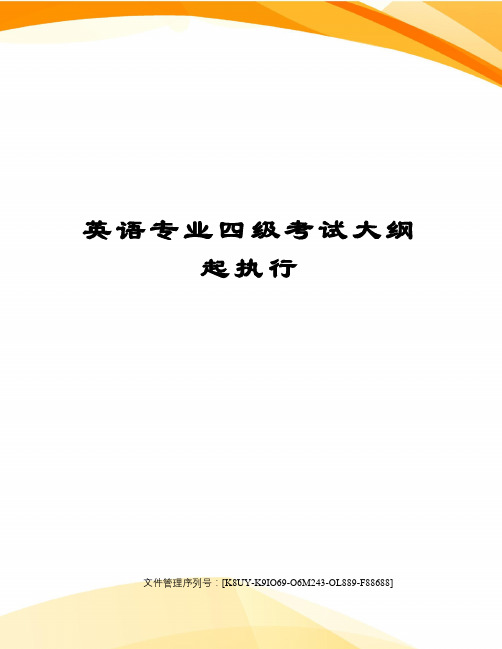
英语专业四级考试大纲起执行文件管理序列号:[K8UY-K9IO69-O6M243-OL889-F88688]请注意:本考纲自2016年启用,考试内容中有调整的重点部分已用黄色标亮。
英语专业四级考试大纲一、考试目的本考试旨在考核英语专业二年级学生综合运用各项基本技能的能力以及学生对语音、词汇、语法、语篇等英语知识的掌握程度。
二、考试的性质与范围本考试属于标准参照性教学检查类考试。
考试范围包括听、读、写技能以及语法、词汇知识。
三、考试时间对象与命题本考试在英语专业第四学期举行,每年一次。
考试对象为英语专业二年级学生。
本考试由外语专业教学测试专家委员会组织有关测试专家命题,外语专业教学测试办公室负责考试的实施。
四、考试形式为了有效地考核学生综合运用各项基本技能的能力,既兼顾考试的科学性、客观性,又考虑到考试的可行性,本考试采用多种试题形式,以保证考试的效度和信度。
五、考试内容本考试共有六个部分:听写、听力理解、语言知识、完型填空、阅读理解、写作。
整个考试需时130分钟。
I. 听写(Part I Dictation)1. 测试要求:(a) 能在全面理解内容的基础上逐字逐句写出所听材料,(b) 考试时间10分钟。
2. 测试形式:本部分采用作答题试题。
所听材料共念四遍,第一遍用正常语速朗读,录音语速为每分钟120个单词,让学生听懂材料大意。
第二、三遍朗读时意群(chunk)、分句和句子之间留出约15秒的空隙,让学生书写。
第四遍再用正常语速朗读,让学生检查。
3. 测试目的:测试学生听力理解能力,拼写熟练程度以及正确运用标点符号的能力。
4. 选材原则:(a) 题材广泛,以学生日常校园和社会生活话题为主。
(b) 听写材料难度略低于中等程度。
(c) 听写材料长度约80-90个单词。
II. 听力理解 (Part II: Listening Comprehension)1. 测试要求:(a) 能听懂英语国家人士关于日常生活、社会生活和学习的演讲和会话。
TEM-4考试大纲
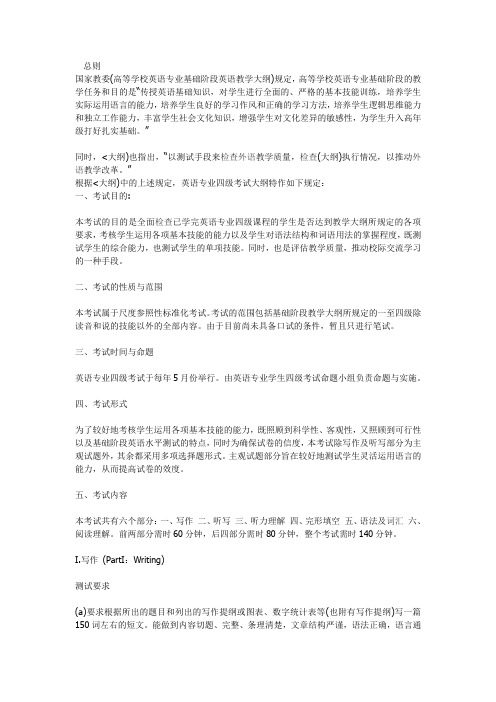
总则国家教委(高等学校英语专业基础阶段英语教学大纲)规定,高等学校英语专业基础阶段的教学任务和目的是“传授英语基础知识,对学生进行全面的、严格的基本技能训练,培养学生实际运用语言的能力,培养学生良好的学习作风和正确的学习方法,培养学生逻辑思维能力和独立工作能力,丰富学生社会文化知识,增强学生对文化差异的敏感性,为学生升入高年级打好扎实基础。
”同时,<大纲)也指出,“以测试手段来检查外语教学质量,检查(大纲)执行情况,以推动外语教学改革。
”根据<大纲)中的上述规定,英语专业四级考试大纲特作如下规定:一、考试目的:本考试的目的是全面检查已学完英语专业四级课程的学生是否达到教学大纲所规定的各项要求,考核学生运用各项基本技能的能力以及学生对语法结构和词语用法的掌握程度,既测试学生的综合能力,也测试学生的单项技能。
同时,也是评估教学质量,推动校际交流学习的一种手段。
二、考试的性质与范围本考试属于尺度参照性标准化考试。
考试的范围包括基础阶段教学大纲所规定的一至四级除读音和说的技能以外的全部内容。
由于目前尚未具备口试的条件,暂且只进行笔试。
三、考试时间与命题英语专业四级考试于每年5月份举行。
由英语专业学生四级考试命题小组负责命题与实施。
四、考试形式为了较好地考核学生运用各项基本技能的能力,既照顾到科学性、客观性,又照顾到可行性以及基础阶段英语水平测试的特点,同时为确保试卷的信度,本考试除写作及听写部分为主观试题外,其余都采用多项选择题形式。
主观试题部分旨在较好地测试学生灵活运用语言的能力,从而提高试卷的效度。
五、考试内容本考试共有六个部分:一、写作二、听写三、听力理解四、完形填空五、语法及词汇六、阅读理解。
前两部分需时60分钟,后四部分需时80分钟,整个考试需时140分钟。
I.写作(PartI:Writing)测试要求(a)要求根据所出的题目和列出的写作提纲或图表、数字统计表等(也附有写作提纲)写一篇150词左右的短文。
英语专业四级考试大纲
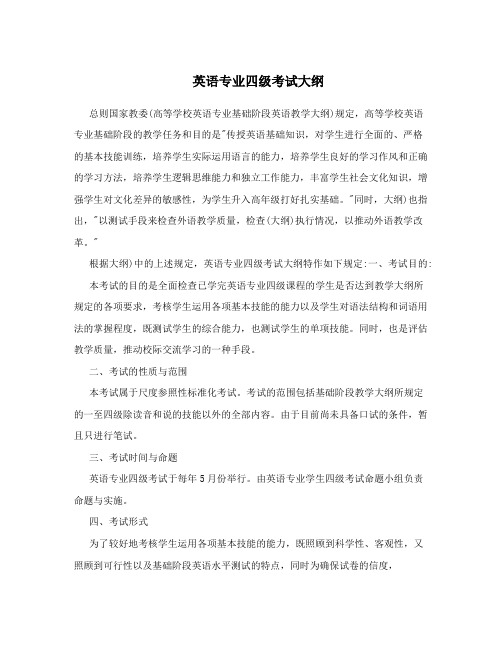
英语专业四级考试大纲总则国家教委(高等学校英语专业基础阶段英语教学大纲)规定,高等学校英语专业基础阶段的教学任务和目的是"传授英语基础知识,对学生进行全面的、严格的基本技能训练,培养学生实际运用语言的能力,培养学生良好的学习作风和正确的学习方法,培养学生逻辑思维能力和独立工作能力,丰富学生社会文化知识,增强学生对文化差异的敏感性,为学生升入高年级打好扎实基础。
"同时,大纲)也指出,"以测试手段来检查外语教学质量,检查(大纲)执行情况,以推动外语教学改革。
"根据大纲)中的上述规定,英语专业四级考试大纲特作如下规定:一、考试目的: 本考试的目的是全面检查已学完英语专业四级课程的学生是否达到教学大纲所规定的各项要求,考核学生运用各项基本技能的能力以及学生对语法结构和词语用法的掌握程度,既测试学生的综合能力,也测试学生的单项技能。
同时,也是评估教学质量,推动校际交流学习的一种手段。
二、考试的性质与范围本考试属于尺度参照性标准化考试。
考试的范围包括基础阶段教学大纲所规定的一至四级除读音和说的技能以外的全部内容。
由于目前尚未具备口试的条件,暂且只进行笔试。
三、考试时间与命题英语专业四级考试于每年5月份举行。
由英语专业学生四级考试命题小组负责命题与实施。
四、考试形式为了较好地考核学生运用各项基本技能的能力,既照顾到科学性、客观性,又照顾到可行性以及基础阶段英语水平测试的特点,同时为确保试卷的信度,本考试除写作及听写部分为主观试题外,其余都采用多项选择题形式。
主观试题部分旨在较好地测试学生灵活运用语言的能力,从而提高试卷的效度。
五考试内容:本考试共有六个部分:听写听力理解完型填空语法与词汇阅读理解写作.整个考试需时130分钟.I.听写(PART I:Dictation)1.测试要求:(a)能在全面理解内容的基础上逐字逐句写出所听材料.(b)拼写和标点符号正确无误,错误率不超过8%(c)考试时间15分钟2.测试形式:本部分为主观试题.所听材料共念四遍.第一遍用正常语速朗读,录音语速为每分钟120个单词,让学生听懂材料大意.第二三遍朗读时意群分句和句子之间留出约15秒的空隙,让学生书写.第四遍再用正常语速朗读,让学生检查.3.测试目的:测试学生听力理解能力拼写熟练程度以及正确运用标点符号的能力.4.选材原则:(a)题材广泛体裁多样.(b)听写材料难度以不超过大纲规定为准.(c)听写材料长Listening Comprehension) 度约150个单词II听力理解(Part II:1.测试要求:(a)能听懂英语国家人士关于日常生活和社会生活的谈话,以及中等难度(如TOEFL中的短文)的听力材料.能理解大意,领会说话者的态度感情和真实意图.(b)能听懂相当于VOA正常语速和BBC新闻节目的主要内容(c)能辨别各种英语变体(如美国英语英国英语澳大利亚英语等)(d)考试时间约15分钟2.测试形式:本部分采用多项选择题,分三节:Section A,Section B,Section C,共30题..Section A:Conversations本部分含有若干组对话,每组约为200个单词.每组对话后有若干道题.本部分共有10题.Section B:Passages本部分含有若干篇短文,每篇长度约为200个单词.每篇后有若干道题.本部分共有10题SectionC:News Broadcast本部分含有若干段VOA或BBC新闻,每段新闻后有若干道题.本部分共有10题.本部分后有5秒的间隙,要求学生从所给的四个选项中选出一个最佳答案.录音语速为每分钟约120个单词,念一遍.3.测试目的:测试学生获得口头信息的能力.4.选材原则:(a)对话和短文中的部分内容与日常生活和学习活动相关.(b)VOA和BBC新闻材料为学生所熟悉的一般新闻报道短评或讲话等.(c)听写材料中所出现的词语原则上不超出大纲规定的范围.III完型填空(Part III:Cloze)1.测试要求:(a)能在全面理解所给短文内容的基础上,选择一个最佳答案使短文意思和结构恢复完整.(b)考试时间15分钟2.测试形式:本部分采用多项选择题.在一篇约250个单词题材熟练难度中等的短文中留出20个空白.每个空白为一题,每题有四个选项.填空的词涉及语法和词汇.3.测试目的:测试学生的综合语言知识和能力IV.语法与词汇.(Part IV:Grammar and Vocabulary)1.测试要求:(a)掌握并能运用大纲规定的一至四级语法内容.(b)掌握大纲规定的基础阶段认知词汇(5500-6000),并且能正确熟练地运用其中的3000-4000个单词及其最基本的搭配(c)考试时间测试形式:本部分采用多项选择题.共30道题,每题有四个选项.题目15分钟2.中约50%为词汇词组和短语用法题,其余为语法结构题.3.测试目的:测试学生阅读理解(Part V:Reading 掌握词汇短语及基本语法概念的熟练程度.V.Comprehension)1.测试要求:(a)能读懂英美国家出版的中等难度的文章和材料.(b)能读懂难度相当于美国Newsweek的国际新闻报道.(c)能读懂难度相当于Sons and Lovers的文学原著(d)能掌握所读材料的主旨大意,了解说明主旨大意的事实和细节;既理解字面意思,又能根据所读材料进行判断和推理;既能理解个别句子的意义,也理解上下文的逻辑关系.(e)能在阅读中根据需要自觉调整阅读速度和阅读技巧.(f)考试时间25分钟2.测试形式:本部分采用多项选择题,由数篇阅读材料组成.阅读材料共长1800个单词左右.每篇材料后有若干道题.学生应根据所读材料内容,从每道题的四个选项中选出一个最佳的答案.共20道题,3.测试目的:本部分测试学生通过阅读获取有关信息的能力,考核学生掌握相关阅读策略和技巧的程度.既要求准确性,也要求一定的速度.阅读速度为每分钟120个单词.4.选材原则:(a)题材广泛,包括社会科技文化经济日常知识人物传记等.(b)体裁多样,包括记叙文描写文说明文议论文广告说明书图表等.(c)阅读材料的语言难度中等,关键词汇基本上不超出大纲规定的范围.VI.写作(Part VI:Writing)1.测试要求:(a)作文:能根据所给的作文题目提纲或图表数据等,写一篇200个单词左右的作文.能做到内容切题完整,条理清楚,结构严谨,语法正确,语言通顺,表达得体.考试时间35分钟.(b)便条:能根据所给提示写50至60个单词的便条通知请贴等.能做到格式正确,语言得体.考试时间10分钟.2.测试形式:本部分分为主观试题,分两节:Section A和Section B.Section A:Composition本题是命题作文,文章体裁主要属于说明文议论文或记叙文的范围Section B:Note-Writing本节是写便条.3.测试目的:按照大纲的要求测试学生书面表达的能力.答题和计分作文和听写做在规定的主观题答题卷上.多项选择题的答案写在客观题答题卷上.凡是写在试题册上的一律无效,予以作废.试卷各部分采用记权方式折算成百分制.以60分为及格标准.。
大学英语四级考试(根据2016版大纲)总览

大学英语考试的作用和影响
1. 大学英语四、六级考试已引起全国 各高等院校及有关教育领导部门对大学 英语教学的重视,调动了师生的积极性。 效度研究的大量统计数据和实验材料证 明大学英语四、六级考试不但信度高, 而且效度高,符合大规模标准化考试的 质量要求,能够按教学大纲的要求反映 我国大学生的英语水平,因此有力地推 动了大学英语教学大纲的贯彻实施,促 进了我国大学英语教学水平的提高。
2007年以后使用新题型
包括:
2012年12月开始实行多题多卷
作文(Writing) 快速阅读(Skimming &scanning) 听力(Listening Comprehension)(包括 8个短对话,2个长对话 ,3 篇短文,1篇复 合式听写) 仔细阅读(Reading in Depth)(1篇选词 {15选10},2篇短文) 完形填空(Cloze,1篇) 翻译(Translation,5个短句)
2. 大学英语考试每年为我国大学生的英 语水平提供客观的描述。 由于大学英语 四、六级考试广泛采用现代教育统计方法, 分数经过等值处理,因此保持历年考试的 分数意义不变。 3.由于大学英语四、六级考试采用正态 分制,使每次考试后所公布的成绩含有大 量信息,成为各级教育行政部门进行决策 的动态依据,也为各校根据本校实际情况 采取措施提高教学质量提供了反馈信息。
全国大学英语四级考试 备考系列讲座
Hale Waihona Puke 关于CET全国大学英语四、六级考试(CET)系教 育部主办、教育部考试中心主持和实施 的一项大规模标准化考试。自1987年 开始实施以来,四、六级考试已走过了 近三十多年的历程。为顺应我国高等教 育发展的形势,深化大学英语的教学改 革,四、六级考试经历了多次改革和完 善,目前考试内容涵盖听、说、读、写、 译等语言技能。
专四考试大纲

专四考试大纲专四考试,即英语专业四级考试,是中国大学英语专业学生的一项重要考试。
它旨在评估学生在英语专业领域的语言能力、文化知识以及翻译和写作等专业技能。
专四考试通常在大学英语专业三年级学生中进行,是衡量学生专业水平的重要标准之一。
考试内容专四考试通常包括以下几个部分:1. 听力理解:测试学生对英语听力材料的理解能力,包括对话、短文、新闻报道等。
题型可能包括选择题、填空题和简答题。
2. 阅读理解:评估学生对不同类型英文文本的理解,如报刊文章、学术文章、小说等。
题型可能包括选择题、判断题和简答题。
3. 语言知识:考察学生对英语语法、词汇和句法结构的掌握程度。
题型可能包括填空题、改错题和翻译题。
4. 写作:测试学生用英语进行书面表达的能力,包括短文写作和应用文写作。
考试可能要求学生写一篇议论文或描述性文章。
5. 翻译:评估学生将中文翻译成英文和将英文翻译成中文的能力。
翻译材料可能包括文学作品、新闻报道或学术论文。
考试形式专四考试通常采用闭卷形式,考试时间一般为2-3小时。
考试内容可能包括客观题和主观题,客观题一般为选择题,而主观题则可能包括填空、简答和写作等。
评分标准专四考试的评分标准通常包括以下几个方面:- 准确性:答案是否正确,翻译是否忠实于原文。
- 流畅性:语言是否自然流畅,表达是否清晰。
- 语法和词汇的正确使用:是否能够正确使用英语语法结构和词汇。
- 内容的完整性:写作和翻译是否涵盖了所有必要的信息点。
备考建议为了在专四考试中取得好成绩,学生应该:- 加强听力训练:通过听英语广播、观看英语电影和电视节目来提高听力理解能力。
- 广泛阅读:阅读不同类型的英文材料,提高阅读理解能力。
- 系统学习语言知识:掌握英语语法规则,扩充词汇量。
- 练习写作:定期练习写作,提高写作技巧和表达能力。
- 翻译练习:多做中英文互译练习,提高翻译能力。
考试准备在考试前,学生应该:- 复习课程内容:回顾所学的语言知识、文化背景和翻译技巧。
2016新版最新大学英语四级考试大纲词汇表
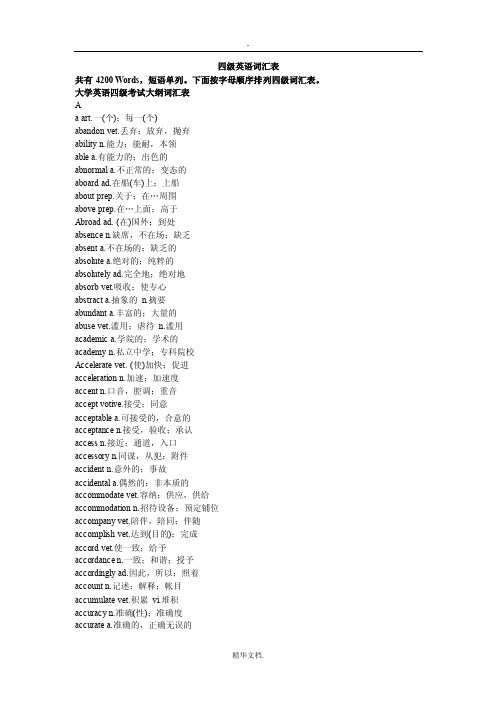
.四级英语词汇表共有4200 Words,短语单列。
下面按字母顺序排列四级词汇表。
大学英语四级考试大纲词汇表Aa art.一(个);每一(个)abandon vet.丢弃;放弃,抛弃ability n.能力;能耐,本领able a.有能力的;出色的abnormal a.不正常的;变态的aboard ad.在船(车)上;上船about prep.关于;在…周围above prep.在…上面;高于Abroad ad. (在)国外;到处absence n.缺席,不在场;缺乏absent a.不在场的;缺乏的absolute a.绝对的;纯粹的absolutely ad.完全地;绝对地absorb vet.吸收;使专心abstract a.抽象的n.摘要abundant a.丰富的;大量的abuse vet.滥用;虐待n.滥用academic a.学院的;学术的academy n.私立中学;专科院校Accelerate vet. (使)加快;促进acceleration n.加速;加速度accent n.口音,腔调;重音accept votive.接受;同意acceptable a.可接受的,合意的acceptance n.接受,验收;承认access n.接近;通道,入口accessory n.同谋,从犯;附件accident n.意外的;事故accidental a.偶然的;非本质的accommodate vet.容纳;供应,供给accommodation n.招待设备;预定铺位accompany vet.陪伴,陪同;伴随accomplish vet.达到(目的);完成accord vet.使一致;给予accordance n.一致;和谐;授予accordingly ad.因此,所以;照着account n.记述;解释;帐目accumulate vet.积累vi.堆积accuracy n.准确(性);准确度accurate a.准确的,正确无误的.accuse vet.指责;归咎于accustom vet.使习惯accustomed a.惯常的;习惯的ache vi.痛;想念n.疼痛achieve vet.完成,实现;达到achievement n.完成;成就,成绩acid n.酸;酸的,酸性的acquaintance n.认识;了解;熟人acquire vet.取得;获得;学到acre n.英亩(=6.07亩)across prep.横过;在…对面act vi.行动;见效n.行为action n.行动;作用;功能active a.活跃的;积极的activity n.活动;活力;行动actor n.男演员;演剧的人actress n.女演员actual a.实际的;现行的actually ad.实际上;竟然acute a.尖的,锐的;敏锐的ad n.广告adapt vet.使适应;改编add vet.添加,附加,掺加addition n.加,加法;附加物additional a.附加的,追加的address n.地址;演说;谈吐adequate a.足够的;可以胜任的adjective n.形容词 a.形容词的adjust vet.调整,调节;校正administration n.管理;管理部门admire vet.钦佩,羡慕,赞赏admission n.允许进入;承认admit vet.承认;准许…进入adopt vet.收养;采用;采取adult n.成年人 a.成年的advance vi.前进;提高n.进展advanced a.先进的;高级的advantage n.优点,优势;好处adventure n.冒险;惊险活动adverb n.副词advertisement n.广告;公告;登广告advice n.劝告;忠告;意见advisable n.明智的;可取的advise vet.劝告;建议;通知.aero plane n.飞机affair n.事情,事件;事务affect vet.影响;感动affection n.慈爱,爱;爱慕afford vet.担负得起…;提供afraid a.害怕的;担心的Africa n.非洲African a.非洲的n.非洲人after prep.在…以后;次于afternoon n.下午,午后afterward ad.后来,以后again ad.又一次;而且against prep.倚在;逆,对着age n.年龄;时代vet.变老agency n.经办;代理;代理处agent n.代理人,代理商aggressive a.侵略的;好斗的ago ad.以前agony n.极度痛苦agree vi.同意;持相同意见agreement n.协定,协议;同意agriculture n.农业,农艺;农学ahead ad.在前;向前;提前aid n.帮助,救护;助手aim vi.瞄准,针对;致力air n.空气;空中;外观aircraft n.飞机,飞行器airline n.航空公司;航线airplane n.飞机airport n.机场,航空站alarm n.惊恐,忧虑;警报alcohol n.酒精,乙醇alike a.同样的,相同的alive a.活着的;活跃的all a.全部的prep.全部allow vet.允许,准许;任alloy n.合金;(金属的)成色almost ad.几乎,差不多alone a.单独的ad.单独地along prep.沿着ad.向前aloud ad.出声地,大声地alphabet n.字母表,字母系统already ad.早已,已经also ad.亦,也;而且,还.alter vet.改变,变更;改做alternative n.替换物;取舍,抉择although conj.尽管,虽然altitude n.高,高度;高处altogether ad.完全;总而言之aluminum n.铝always ad.总是,一直;永远am (缩)上午,午前amaze vet.使惊奇,使惊愕ambition n.雄心,抱负,野心ambulance n.救护车;野战医院America n.美洲;美国American a.美洲的n.美国人among prep.在…之中amongst prep在…之中(=among)amount n.总数;数量;和ampere n.安培amplify vet.放大,增强;扩大amuse vet.逗…乐;给…娱乐analyze vet.分析,分解,解析analysis n.分析,分解,解析ancestor n.祖宗,祖先anchor n.锚vi.抛锚,停泊ancient a.古代的,古老的and conj.和,又,并,则angel n.天使,神差,安琪儿anger n.怒,愤怒vet.使发怒angle n.角,角度angry a.愤怒的,生气的animal n.动物,兽 a.动物的ankle n.踝,踝节部announce vet.宣布,宣告,发表announcer n.宣告者;播音员annoy vet.使恼怒;打搅annual a.每年的n.年报another a.再一个的;别的answer vet.回答;响应;适应ant n.蚂蚁anticipate vet.预料,预期,期望anxiety n.焦虑,忧虑;渴望anxious a.忧虑的;渴望的any a.什么,一些;任何的anybody prep.任何人anyhow ad.无论如何.anyone pron.任何人anything pron.任何事物;一切anyway ad.无论如何anywhere ad.在什么地方apart ad.相隔;分开;除去apartment n.一套公寓房间apologize vi.道歉,谢罪,认错apology n.道歉,认错,谢罪apparatus n.器械,仪器;器官apparent a.表面上的;明显的Appeal VI. &n.呼吁;申述appear vi.出现;来到;似乎appearance n.出现,来到;外观appetite n.食欲,胃口;欲望apple n.苹果,苹果树appliance n.用具,器具,器械applicable a.能应用的;适当的application n.请求,申请;施用apply vet.应用,实施,使用appoint vet.任命,委任;约定appointment n.任命;约定,约会appreciate vet.欣赏;领会;感谢approach vet.向…靠近n.靠近appropriate a.适当的,恰当的approval n.赞成,同意;批准approve vet.赞成,称许;批准approximate a.近似的vet.近似approximately ad.近似地,大约April n.四月Arabian a.阿拉伯的arbitrary a.随心所欲的;专断的architecture n.建筑学;建筑式样area n.面积;地区;领域argue vi.争论,争辩,辩论argument n.争论,辩论;理由arise vi.出现;由…引起arithmetic n.算术,四则运算arm n.臂;臂状物;武器army n.军队;陆军around prep.在…周围arouse vet.引起,唤起;唤醒arrange vet.筹备;整理;调解arrangement n.整理,排列;安排arrest vet.逮捕,拘留;阻止.arrival n.到达;到来;到达者arrive vi.到达;来临;达到arrow n.箭;箭状物art n.艺术,美术;技术article n.文章;条款;物品artificial a.人工的;娇揉造作的artist n.艺术家,美术家artistic a.艺术的;艺术家的as conj.当…的时候ash n.灰,灰末;骨灰ashamed a.惭愧(的);羞耻(的)Asia n.亚洲Asian a.亚洲的n.亚洲人aside ad.在旁边,到旁边ask vet.问;要求;邀请asleep a.睡着的,睡熟的aspect n.方面;样子,外表assemble vet.集合,召集;装配assembly n.集合;集会;装配assess vet.对(财产等)估价assign vet.指派;分配;指定assignment n.任务,指定的作业assist vet.援助,帮助;搀扶assistant n.助手,助理;助教associate vi.交往n.伙伴,同事association n.协会,团体;联合assume vet.假定;承担;呈现assure vet.使确信;向…保证astonish vet.使惊讶,使吃惊astronaut n.宇宙航行员,宇航员at prep.在…里;在…时athlete n.运动员;田径运动员Atlantic a.大西洋的n.大西洋atmosphere n.大气;空气;气氛atmospheric a.大气的;大气层的atom n.原子;微粒;微量atomic a.原子的;原子能的attach vet.缚,系,贴;附加Attack VT. &VI. &n.攻击,进攻attain vet.达到,获得,完成attempt vet.尝试,试图n.企图attend vet.出席;照顾,护理attention n.注意,留心;注意力attentive a.注意的;有礼貌的.attitude n.态度,看法;姿势attract vet.吸引;引起,诱惑attraction n.吸引;吸引力;引力attractive a.有吸引力的attribute vet.把…归因于n.属性audience n.听众,观众,读者August n.八月aunt n.伯母,婶母,姑母aural a.耳的,听觉的Australia n.澳大利亚Australian a.澳大利亚的author n.作者,作家authority n.当局,官方;权力Auto n. (口语) 汽车automatic a.自动的;机械的automation n.自动,自动化automobile n.汽车,机动车autumn n.秋,秋季auxiliary a.辅助的;附属的available a.可利用的;通用的avenue n.林荫道,道路;大街average n.平均数 a.平均的aviation n.航空,航空学avoid vet.避免,躲开;撤消await vet.等候,期待awake a.醒着的vet.唤醒award n.奖,奖品;判定aware a.知道的,意识到的away ad.离开,远离;…去awful a.令人不愉快的awfully ad.令人畏惧的;很awkward a.笨拙的;尴尬的ax n.斧子axis n.轴,轴线;中心线大学英语四级考试大纲词汇表B.baby n.婴儿;孩子气的人back ad.在后;回原处;回background n.背景,后景,经历backward a.向后的;倒的ad.倒bacteria n.细菌bad a.坏的,恶的;严重的badly ad.坏,差;严重地badminton n.羽毛球bag n.袋,包,钱包,背包baggage n.行李bake vet.烤,烘,焙;烧硬balance vet.使平衡;称n.天平ball n.球,球状物;舞会balloon n.气球,玩具气球banana n.香蕉;芭蕉属植物band n.乐队;带;波段bang n.巨响,枪声;猛击bank n.银行;库;岩,堤banner n.旗,旗帜,横幅bar n.酒吧间;条,杆;栅barber n.理发师bare a.赤裸的;仅仅的bargain n.交易vi.议价;成交bark n.吠叫声vi.吠,叫barn n.谷仓;牲口棚barrel n.桶;圆筒;枪管barrier n.栅栏,屏障;障碍base n.基础,底层;基地basic a.基本的,基础的basically ad.基本上basin n.盆,洗脸盆;盆地basis n.基础,根据basket n.篮,篓,筐basketball n.篮球;篮球运动bat n.球拍;短棍;蝙蝠bath n.浴,洗澡;浴缸bathe vet.给…洗澡;弄湿bathroom n.浴室;盥洗室battery n.电池;一套,一组battle n.战役;斗争vi.作战bay n.湾;山脉中的凹处B.C. (缩)公元前Be aux.v. &vi.是,在,做beach n.海滩,湖滩,河滩.beam n.梁;横梁;束,柱bean n.豆,蚕豆bear n.熊;粗鲁的人bear vet.容忍;负担;生育beard n.胡须,络腮胡子beast n.兽,野兽;牲畜Beat VT. &vi.打,敲;打败beautiful a.美的,美丽的beauty n.美,美丽;美人because conj.由于,因为become vi.变成;成为,变得bed n.床,床位;圃;河床bee n.蜂,密蜂;忙碌的人beef n.牛肉;菜牛beer n.啤酒before prep.在…以前;向…Beg VT. &vi.乞求;请求beggar n.乞丐,穷人begin vi.开始vet.开始beginner n.初学者,生手beginning n.开始,开端;起源behalf n.利益,维护,支持behave vi.表现,举止;运转behavior n.行为,举止,态度behind prep.在…后面being n.存在;生物;生命belief n.信任,相信;信念believe vet.相信;认为bell n.钟,铃,门铃;钟声belong vi.属于,附属beloved a.为…的爱的n.爱人below prep.在…下面(以下)belt n.带,腰带;皮带;区bench n.长凳,条凳;工作台bend vet.使弯曲vi.弯曲beneath prep.在…下方beneficial a.有利的,有益的benefit n.利益;恩惠;津贴berry n.浆果(如草莓等)beside prep.在…旁边besides ad.而且prep.除…之外best a.最好的;最大的Bet VT. &VI. &n.打赌betray vet.背叛;辜负;泄漏.better a.较好的ad.更好地between prep.在…中间beyond prep.在…的那边Bible n.基督教《圣经》bicycle n.自行车,脚踏车big a.大的,巨大的bike n.自行车vi.骑自行车bill n.账单;招贴;票据billion num.万亿(英)bind vet.捆绑;包扎;装钉biology n.生物学;生态学bird n.鸟,禽birth n.分娩,出生;出身birthday n.生日,诞生的日期Biscuit n. (英) 饼干;(美) 软饼bit n.一点,一些,小片bite vet.咬,叮,螫;剌穿bitter a.痛苦的;严寒的bitterly ad.苦苦地;悲痛地black a.黑色的;黑暗的blackboard n.黑板blade n.刀刃,刀片;叶片blame vet.责备,把…归咎于blank a.空白的n.空白blanket n.毛毯,毯子,羊毛毯blast n.爆炸,冲击波vet.炸blaze n.火;闪光vi.燃烧bleed vi.出血,流血;泌脂Blend VT. &VI. &n.混和bless vet.为…祝福blind a.瞎的;盲目的block n.街区vet.堵塞,拦阻blood n.血,血液;血统bloom n.花;开花,开花期blossom n.花,开花vi.开花blow vi.吹,吹动;吹响blue a.蓝色的n.蓝色board n.板vet.上(船、车等)boast vi.自夸vet.吹嘘boat n.小船,艇;渔船body n.身体;主体;尸体boil vi.沸腾;汽化vet.煮沸bold a.大胆的;冒失的bolt n.螺栓;插销vet.闩门.bomb n.炸弹vet.轰炸bond n.联结,联系;公债bone n.骨,骨骼book n.书,书籍vet.预定boot n.靴子,长统靴booth n.货摊;公用电话亭border n.边,边缘;边界bore vet.使厌烦;钻,挖born a.天生的;出生的borrow vet.借,借用,借人bosom n.胸,胸部;内心boss n.老板,上司vet.指挥both pron.两者(都)bother vet.烦扰,迷惑n.麻烦bottle n.瓶,酒瓶;一瓶bottom n.底,底部,根基bough n.树枝bounce vi.反跳,弹起;跳起bound a.一定的;有义务的boundary n.分界线,办界bow n.弓;蝴蝶结;鞠躬bowl n.碗,钵;碗状物box n.箱,盒;包箱box vi.拳击,打拳boy n.男孩,少年;家伙brain n.脑,脑髓;脑力brake n.闸,刹车vi.制动branch n.树枝;分部;分科brand n.商品;烙印vet.铭刻brandy n.白兰地酒brass n.黄铜;黄铜器brave a.勇敢的,华丽的bread n.面包;食物,粮食breadth n.宽度,幅度;幅面break vet.打破;损坏;破坏breakfast n.早饭,早餐breast n.乳房;胸脯,胸膛breath n.气息,呼吸;气味breathe vi.呼吸vet.呼吸breed n.品种vet.使繁殖breeze n.微风,和风brick n.砖,砖块;砖状物bridge n.桥,桥梁;桥牌brief a.简短的;短暂的.bright a.明亮的;聪明的brighten vet.使发光;使快活brilliant a.光辉的;卓越的brim n.边,边缘;帽沿bring vet.带来;引出;促使brisk a.活泼的;清新的bristle n.短而硬的毛;鬃毛Britain n.不列颠,英国British a.不列颠的,英联邦的brittle a.脆的;易损坏的broad a.宽的,阔的;广泛的broadcast n.广播,播音broken a.被打碎的,骨折的bronze n.青铜;青铜制品brood n.同窝幼鸟vet.孵(蛋)brook n.小河,溪流broom n.扫帚brother n.兄弟;同事,同胞brow n.额;眉,眉毛brown n.褐色,棕色bruise n.青肿,伤痕;擦伤brush n.刷子,毛刷;画笔brute n.禽兽,畜生bubble n.泡vi.冒泡,沸腾bucket n.水桶;吊桶;铲斗bud n.芽,萌芽;蓓蕾build vet.建筑;建立;创立building n.建筑物,大楼;建筑bulb n.电灯泡;球状物bulk n.物体,容积,大批bull n.公牛;雄的象bullet n.枪弹,子弹,弹丸bunch n.束,球,串;一群bundle n.捆,包,束;包袱burden n.担子,重担;装载量bureau n.局,司,处;社,所burn vi.烧,燃烧n.烧伤burst vet.使爆裂vi.&n.爆炸bury vet.埋葬,葬;埋藏bus n.公共汽车bush n.灌木,灌木丛,矮树business n.商业,生意;事务busy a.忙的,繁忙的but conj.但是,可是.butcher n.屠夫;屠杀者butter n.黄油;奶油butterfly n.蝴蝶button n.扣子;按钮vet.扣紧buy vet.买,购买vi.买by prep.在…旁;被,由大学英语四级考试大纲词汇表Ccabbage n.洋白菜,卷心菜cabin n.小屋;船舱,机舱cabinet n.橱,柜;内阁cable n.缆,索;电缆;电报cafe n.咖啡馆;小餐厅cafeteria n.自助食堂cage n.笼;鸟笼,囚笼cake n.饼,糕,蛋糕calculate vet.计算;估计;计划calculation n.计算,计算结果calculator n.计算器,计算者calendar n.日历,历书;历法call vet.把…叫做;叫,喊calm a.静的,平静的camel n.骆驼camera n.照相机,摄影机camp n.野营,营地,兵营campaign n.战役;运动campus n.校园,学校场地can ex.能,会,可能can n.罐头,听头;容器Canada n.加拿大Canadian a.加拿大的canal n.运河;沟渠;管cancel vet.取消,撤消;删去cancer n.癌,癌症,肿瘤candidate n.候选人;投考者candle n.蜡烛;烛形物;烛光candy n.糖果;砂糖结晶.cannon n.大炮,火炮;榴弹炮canoe n.独木舟,皮艇,划子canteen n.小卖部;临时餐室canvas n.粗帆布;一块油画布cap n.帽子,便帽;帽状物capable a.有能力的,有才能的capacity n.容量;能力;能量capital n.资本,资金;首都captain n.陆军上尉;队长captive n.俘虏,被监禁的人capture vet.捕获,俘获;夺得car n.汽车,小汽车,轿车carbon n.碳card n.卡,卡片,名片care vi.关心,介意n.小心career n.生涯,职业,经历careful a.仔细的;细致的careless a.粗心的,漫不经心的cargo n.船货,货物carpenter n.木工,木匠carpet n.地毯,毡毯,毛毯carriage n.客车厢;四轮马车carrier n.运输工具;运载工具carrot n.胡罗卜carry vet.携带;运载;传送cart n.二轮运货马车carve vet.刻,雕刻;切开case n.情况;事实;病例case n.箱(子),盒(子),套cash n.现金,现款cassette n.盒式录音带;盒子cast vet.投,扔,抛;浇铸castle n.城堡;巨大建筑物casual a.偶然的;随便的cat n.猫,猫科,猫皮catalog n.目录,目录册catch vet.捉住;赶上;领会cathedral n.总教堂;大教堂cattle n.牛;牲口,家畜cause n.原因,理由;事业cave n.山洞,洞穴,窑洞Cease VI. &VI. &n.停止,停息ceiling n.天花板,顶蓬celebrate vet.庆祝;歌颂,赞美.cell n.细胞;小房间cellar n.地窑,地下室cement n.水泥;胶泥vet.粘结cent n.分;分币;百centigrade a.百分度的centimeter n.公分,厘米central a.中心的;主要的centre n.中心;中枢vet.集中century n.世纪,百年ceremony n.典礼,仪式;礼节certain a.确实的;肯定的certainly ad.一定,必定;当然certainty n.必然;肯定certificate n.证书,证件,执照chain n.链,链条,项圈chair n.椅子;主席chairman n.主席;议长,会长chalk n.白垩;粉笔challenge n.挑战;要求,需要chamber n.会议室;房间;腔champion n.冠军,得胜者chance n.机会,机遇;可能性change n.改变,变化;零钱channel n.海峡;渠道;频道chapter n.章,回,篇character n.性格;特性;角色characteristic a.特有的n.特性charge vet.索价;控告n.费用charity n.施舍;慈善事业charming a.迷人的,可爱的chart n.图,图表;海图chase n.追逐,追赶,追求cheap a.廉价的;劣质的cheat vet.骗取;哄vi.行骗check vet.检查;制止n.检查cheek n.面颊,脸蛋cheer vet.使振作;欢呼cheerful a.快乐的,愉快的cheese n.乳酪,干酪chemical a.化学的n.化学制品chemist n.化学家;药剂师chemistry n.化学cherub n.支票cherry n.樱桃;樱桃树.chess n.棋;国际象棋chest n.胸腔,胸膛;箱子chew vet.咀嚼,嚼碎chicken n.小鸡,小鸟;鸡肉chief a.主要的;首席的child n.小孩,儿童;儿子childhood n.童年,幼年;早期childish a.孩子的;幼稚的chill vet.使变冷n.寒冷chimney n.烟囱,烟筒;玻璃罩chin n.颏,下巴China n.中国china n.瓷器,瓷料Chinese a.中国的n.中国人chocolate n.巧克力;巧克力糖choice n.选择,抉择choke vet.使窒息;塞满choose vet.选择,挑选;情愿chop vet.砍,劈;切细vi.砍Christian n.基督教徒;信徒Christmas n.圣诞节church n.教堂,礼拜堂;教会cigarette n.香烟,纸烟,卷烟cinema n.电影院;电影,影片circle n.圆,圆周;圈子circuit n.电路;环行;巡行circular a.圆的;循环的circulate vet.使循环vi.循环circumference n.圆周,周长,圆周线circumstance n.情况,条件;境遇citizen n.公民;市民,居民city n.城市,都市civil a.公民的;文职的civilization n.文明,文化;开化civilize vet.使文明;教育claim vet.声称,主张;索取clap vi.拍手vet.拍,轻拍clarify vet.澄清,阐明clasp n.扣子,钩子;别针class n.班,班级;阶级classical a.古典的;经典的classification n.分类;分级;分类法classify vet.把…分类classmate n.同班同学.classroom n.教室,课堂claw n.爪,脚爪,螯clay n.粘土,泥土;肉体clean a.清洁的;纯洁的clear a.清晰的vet.清除clearly ad.明白地,清晰地clerk n.店员;办事员,职员clever a.聪明的;机敏的cliff n.悬崖,峭壁climate n.气候;风土,地带climb vi.攀登,爬vet.爬cloak n.斗篷;覆盖(物)clock n.钟,仪表close vet.关,闭;结束closely ad.紧密地,接近地cloth n.布;衣料;桌布clothe vet.给…穿衣服clothes n.衣服,服装;被褥clothing n.衣服,被褥cloud n.云;云状物;阴影cloudy a.多云的;云一般的club n.俱乐部,夜总会clue n.线索,暗示,提示clumsy a.笨拙的;愚笨的coach n.长途公共汽车coal n.煤,煤块coarse a.粗的,粗糙的coast n.海岸,海滨(地区)coat n.外套,上衣;表皮cock n.公鸡;雄禽;旋塞code n.准则;法典;代码coffee n.咖啡,咖啡茶Coil n. (一) 卷;线圈vet.卷coin n.硬币;铸造(硬币)cold a.冷的;冷淡的n.冷collapse vi.倒坍;崩溃,瓦解collar n.衣领,项圈colleague n.同事,同僚collect vet.收集vi.收款collection n.搜集,收集;收藏品collective a.集体的;集合性的college n.学院;大学collision n.碰撞;冲突colonel n.陆军上校;中校.colony n.殖民地;侨居地color n.颜色,彩色;颜料column n.柱,支柱,圆柱comb n.梳子vet.梳理combination n.结合,联合;化合combine vet.使结合;兼有come vi.来,来到;出现comfort n.舒适;安慰vet.安慰comfortable a.舒适的,安慰的command vet.命令,指挥;控制commander n.司令官,指挥员comment n.评论,意见;注释commerce n.商业,贸易;社交commercial a.商业的;商品化的commission n.委任状;委员会commit vet.犯(错误);干(坏事)committee n.委员会;全体委员common a.普通的;共同的commonly ad.普通地,一般地communicate vi.通讯;传达;传播communication n.通讯;传达;交通communism n.共产主义communist n.共产党员community n.社区;社会;公社companion n.同伴;共事者;伴侣company n.公司,商号;同伴comparative a.比较的,相对的compare vet.比较,对照;比作comparison n.比较,对照;比似compass n.罗盘,指南针;圆规compel vet.强迫,迫使屈服compete vi.比赛;竞争;对抗competent a.有能力的;应该做的competition n.竞争,比赛compile vet.编辑,编制,搜集complain vi.抱怨,拆苦;控告complaint n.抱怨;怨言;控告complete a.完整的;完成的completely ad.十分,完全地complex a.结合的;复杂的complicate vet.使复杂;使陷入complicated a.复杂的,难懂的component n.组成部分;分;组件compose vet.组成,构成;创作.composition n.构成;作品;写作compound n.化合物;复合词comprehension n.理解,理解力;领悟comprehensive a.广泛的;理解的compress vet.压紧,压缩comprise vet.包含,包括;构成compromise n.妥协,和解compute vet.计算,估计,估算computer n.计算机,电脑comrade n.同志,亲密的同伴conceal vet.把…隐藏起来concentrate vet.集中;聚集;浓缩concentration n.集中;专注;浓缩concept n.概念,观念,设想concern n.关心,挂念;关系concerning prep.关于concert n.音乐会,演奏会conclude vet.推断出;结束conclusion n.结论,推论;结尾concrete n.混凝土;具体物condemn vet.谴责,指责;判刑condense vet.压缩,使缩短condition n.状况,状态;环境conduct n.举止,行为;指导conductor n.售票员;(乐队)指挥conference n.会议,讨论会confess vet.供认,承认;坦白confidence n.信任;信赖;信心confident n.确信的,自信的confine vet.限制;禁闭confirm vet.证实,肯定;批准conflict n.争论;冲突;斗争confuse vet.使混乱,混淆confusion n.混乱;骚乱;混淆congratulate vet.祝贺,向…道喜congratulation n.祝贺;祝贺词congress n.大会;国会,议会conjunction n.接合,连接;连接词connect vet.连接,连结;联系connection n.连接,联系;连贯性conquer vet.征服,战胜;破除conquest n.攻取,征服;克服conscience n.良心,道德心conscious a.意识到的;有意的.consciousness n.意识,觉悟;知觉consent n.同意,赞成vi.同意consequence n.结果,后果consequently ad.因此,因而,所以conservation n.保存,保护;守恒conservative a.保守的n.保守的人consider vet.认为;考虑;关心considerable a.相当大的;重要的considerate a.考虑周到的;体谅的consideration n.考虑,思考;体贴consist vi.由…组成;在于consistent a.坚持的,一贯的constant a.经常的;永恒的constitution n.章程;体质;构造construct vet.建造;建设;构筑construction n.建造;建筑;建筑物consult vet.请教,查阅consume vet.消耗,消费;消灭consumption n.消耗量;消耗contact vet.使接触;与…联系contain vet.包含,容纳;等于container n.容器;集装箱contemporary a.当代的,同时代的contempt n.轻蔑;藐视;受辱content n.内容,目录;容量content a.满意的,满足的contest vet.争夺,争取;辩驳continent n.大陆;陆地;洲continual a.不断的;连续的continue vet.继续,连续;延伸continuous a.连续不断的,持续的contract n.契约,合同;婚约contradiction n.矛盾,不一致;否认contrary a.相反的n.相反contrast n.对比,对照,悬殊contribute vet.捐献,捐助;投稿control vet.控制,克制n.控制convenience n.便利,方便;厕所convenient a.便利的;近便的convention n.习俗,惯例;公约conventional a.普通的;习惯的conversation n.会话,非正式会谈conversely ad.相反地conversion n.转变,转化;改变.convert vet.使转变;使改变convey vet.传送;运送;传播convince vet.使确信,使信服cook vet.烹调,煮vet.烧菜cool a.凉的,冷静的cooperate vi.合作,协作;配合coordinate vet.使协调,调节cope vi.对付,应付copper n.铜;铜币,铜制器copy n.抄件vet.抄写,复制cord n.细绳,粗线,索cordial a.真诚的,诚恳的core n.果实的心,核心corn n.谷物;(英)小麦corner n.角;犄角;边远地区corporation n.公司,企业;社团correct a.正确的vet.纠正correction n.改正,纠正,修改correspond vi.相符合;相当correspondent n.通信者;通讯员corresponding a.相应的;符合的corridor n.走廊,回廊,通路cost n.价格,代价;成本costly a.昂贵的;价值高的cottage n.村舍,小屋cotton n.棉;棉线;棉布cough vi.咳,咳嗽n.咳嗽Could ex. (can的过去式)council n.理事会,委员会count vet.计算vi.数,计数counter n.柜台;计数器country n.国家,国土;农村countryside n.乡下,农村county n.英国的郡,美国的县couple n.夫妇;(一)对;几个courage n.勇气,胆量,胆识course n.课程;过程;一道菜court n.法院,法庭;庭院cousin n.堂(或表)兄弟(姐妹)cover vet.盖,包括n.盖子cow n.母牛,奶牛;母兽coward n.懦夫;胆怯者crack n.裂缝,裂纹vi.爆裂craft n.工艺;手艺,行业.crane n.起重机,摄影升降机crash vi.碰撞,坠落n.碰撞crawl vi.爬,爬行crazy a.疯狂的,荒唐的cream n.奶油,乳脂;奶油色create vet.创造;引起,产生creative a.创造性的,创作的creature n.生物,动物,家畜credit n.信用贷款;信用creep vi.爬行;缓慢地行进crew n.全体船员cricket n.板球;蟋蟀crime n.罪,罪行;犯罪criminal n.犯人,罪犯,刑事犯cripple n.跛子;残废的人crisis n.危机;存亡之际critic n.批评家,爱挑剔的人critical a.决定性的;批评的criticism n.批评;批判;评论criticize vet.批评;评论;非难crop n.农作物,庄稼;一熟cross vet.穿过;使交叉crow n.鸦,乌鸦vi.啼crowd n.群;大众;一伙人crown n.王冠,冕;花冠crude a.简陋的;天然的cruel a.残忍的,残酷的crush vet.压碎,碾碎;镇压crust n.面包皮;硬外皮cry vi.哭,哭泣;叫喊crystal n.水晶,结晶体;晶粒cube n.立方形;立方cubic a.立方形的;立方的cucumber n.黄瓜cultivate vet.耕;种植;培养culture n.文化,文明;教养cunning a.狡猾的,狡诈的cup n.杯子;(一)杯;奖杯cupboard n.碗柜,碗碟橱;食橱cure vet.医治;消除n.治愈curiosity n.好奇,好奇心;珍品curious a.好奇的;稀奇古怪的curl n.卷毛;螺旋vi.卷曲current a.当前的;通用的.curse n.诅咒,咒骂;天谴curtain n.帘,窗帘;幕(布)curve n.曲线;弯vet.弄弯cushion n.垫子,坐垫,靠垫custom n.习惯,风俗;海关customer n.顾客,主顾cut vet.切,割,剪;减少cycle n自行车,循环大学英语四级考试大纲词汇表Ddaily a.每日的n.日报dairy n.牛奶场;乳制品dam n.水坝,水堤;障碍物damage vet.损害,毁坏n.损害damp a.潮湿的,有湿气的dance vi.跳舞;摇晃n.舞danger n.危险;危险事物dangerous a.危险的,不安全的Dare VT. &aux.v.敢;竟敢daring a.大胆的,勇敢的dark a.暗的;黑色的darling n.亲爱的人;宠儿dash vet.使猛撞;溅n.猛冲data n.数据; 资料date n.日期vet.注…日期daughter n.女儿dawn n.黎明;开端vi.破晓Day n. (一) 天,白昼,白天daylight n.白昼,日光;黎明dead a.死的,无生命的deadly a.致命的,死一般的deal n.买卖;待遇vet.给予dear a.亲爱的int.啊death n.死,死亡;灭亡Debate n. &vi.争论,辩论debt n.债,债务,欠债decade n.十年,十年期decay vi.腐烂;衰败n.腐烂deceit n.欺骗,欺诈deceive vet.欺骗,蒙蔽,行骗December n.十二月decent a.正派的;体面的decide vet.决定,决心;解决decision n.决定,决心;果断deck n.甲板;舱面;层面declare vet.断言;声明;表明decorate vet.装饰,装璜,修饰decrease vi.&n.减少,减少deduce vet.演绎,推论,推断deed n.行为;功绩;契约deep a.深的;纵深的deepen vet.加深vi.深化deer n.鹿defeat vet.战胜,击败;挫败defect n.缺点,缺陷,欠缺defence n.防御;防务;辩护defend vet.保卫,防守define vet.给…下定义;限定definite a.明确的;肯定的definitely ad.一定地,明确地definition n.定义,释义;定界degree n.程度;度;学位delay vet.推迟;耽搁;延误delete vet.删除;擦掉delegation n.代表团delicate a.纤细的;易碎的delicious a.美味的,怡人的delight n.快乐vet.使高兴deliver vet.投递,送交;发表delivery n.投递;交付;分娩demand vet.要求;需要;询问democracy n.民主,民主制democratic a.民主的,民主政体的demonstrate vet.说明;论证;表露density n.密集,稠密;密度deny vet.否定;拒绝相信depart vi.离开,起程;出发department n.部,司,局,处,系departure n.离开,出发,起程depend vi.依靠,依赖;相信dependent a.依靠的,依赖的deposit vet.使沉淀;存放depress vet.使沮丧;按下depth n.深度;深厚;深处derive vet.取得vi.起源descend vi.下来,下降;下倾describe vet.形容;描写,描绘description n.描写,形容;种类desert n.沙漠vet.离弃;擅离deserve vet.应受,值得design vet.设计n.设计;图样desirable a.值得相望的;可取的desire vet.相望;要求n.愿望desk n.书桌,办公桌despair n.绝望vi.绝望desperate a.拼死的;绝望的despise vet.鄙视,蔑视despite prep.不管,不顾destination n.目的地,终点;目标destroy vet.破坏;消灭;打破destruction n.破坏,毁灭,消灭detail n.细节;枝节;零件detect vet.察觉,发觉;侦察detection n.察觉,发觉;侦察determination n.决心;决定;确定determine vet.决定;查明;决心develop vet.发展;形成;开发development n.发展;开发;生长device n.器械,装置;设计devil n.魔鬼,恶魔devise vet.设计,发明devote vet.将…奉献,致力于dew n.露,露水diagram n.图解,图表,简图dial n.钟面;拨号盘vet.拨dialect n.方言,土语,地方话dialog n.对话,对白.diameter n.直径diamond n.金钢石,钻石;菱形diary n.日记,日记簿dictate vt.&vi.口授;命令dictation n.口授笔录,听写dictionary n.词典,字典die vi.死,死亡;灭亡differ vi.不同,相异difference n.差别;差;分歧different a.差异的;各种的difficult a.困难的;难对付的difficulty a.困难;难事;困境dig vet.掘,挖;采掘digest vet.消化;领会n.文摘digital a.数字的,计数的diligent a.勤勉的,勤奋的dim a.昏暗的;朦胧的dimension n.尺寸,尺度;面积dinner n.正餐,主餐;宴会dip vet.浸,蘸vi.浸一浸direct a.直接的;直率的direction n.方向,方位;指导directly ad.直接地;立即director n.指导者;理事;导演dirt n.尘,土;污物,污垢dirty a.脏的;下流的disable vet.使无能,使伤残disadvantage n.不利,不利地位disagree vi.有分歧;不一致disappear vi.不见,失踪;消失disappoint vet.使失望,使受挫折disaster n.灾难,灾祸;天灾disk n.圆盘,唱片;磁盘discard vet.丢弃,抛弃,遗弃discharge vet.释放;排出n.释放discipline n.纪律;训练vet.训练disclose vet.揭开,揭发;透露discourage vet.使泄气,使灰心discover vet.发现;暴露,显示discovery n.发现;被发现的事物discuss vet.讨论,谈论;论述discussion n.讨论,谈论;论述disease n.病,疾病;病害disguise vi.隐瞒,掩埋n.假装.disgust n.厌恶,憎恶dish n.碟,盘子;菜肴dishonour n.不光彩;丢脸的人dislike vt.&n.不喜爱,厌恶dismiss vet.不再考虑;解雇disorder n.混乱,杂乱;骚乱display vet.陈列,展览;显示disposal n.丢掉,处理,销毁dispose vi.去掉,丢掉;销毁displease vet.使不愉快,使生气dispute vi.争论,争执n.争论dissatisfy vi.使不满,使不平dissolve vet.使溶解;解散distance n.距离,间距;远处distant a.在远处的,疏远的distinct a.与其他不同的distinction n.差别,不同,区分distinguish vet.区别,辨别,认别distress n.忧虑,悲伤;不幸distribute vet.分发,分送;分布distribution n.分发,分配;分布district n.区;地区,区域disturb vet.打扰,扰乱;弄乱ditch n.沟,沟渠,渠道dive vi.跳水;潜水;俯冲diverse a.不一样的,相异的divide vet.分;分配;分开division n.分,分配;除法divorce n.离婚,离异vi.离婚do aux.v. vet.做,干,办dock n.船坞;码头;船厂doctor n.医生,医师;博士document n.公文,文件;证件dog n.狗,犬,犬科动物dollar n.元(货币单位)domestic a.本国的;家庭的donkey n.驴;笨蛋door n.门,通道;一家dorm n.宿舍dormitory n.集体寝室;宿舍dose n.剂量,用量;一剂dot n.点,圆点vet.打点于double a.两倍的;双的doubt n.怀疑;疑虑vet.怀疑.doubtful a.难以预测的;怀疑的doubtless ad.无疑地;很可能down ad.向下,在下面downstairs ad.在楼下a.楼下的downward a.向下的ad.向下地dozen n.一打,十二个draft n.草稿;汇票vet.起草drag vet.拖,拉;拖曳dragon n.龙;凶暴的人drain vet.排去;放水n.耗竭drama n.一出戏剧,剧本dramatic a.引人注目的,戏剧的draw vet.画,划;拖;拨出drawer n.抽屉drawing n.图画,素描;绘图dread n.畏惧;恐怖vet.惧怕dream n.梦;梦想vi.做梦dress n.女服,童装;服装drift vi.漂流,漂泊n.漂流drill n.钻头;操练vi.钻孔drink vet.饮vi.喝n.饮料drip vi.滴下;漏水n.水滴drive vet.驾驶;打入;驱driver n.驾驶员,司机drop vet.使落下;降低drought n.旱灾,干旱drown vi.淹死,溺死drug n.药,药物,药材drum n.鼓;鼓状物,圆桶drunk a.醉的;陶醉的dry a.干的,干燥的duck n.鸭,雌鸭;鸭肉due a.预期的;应给的dull a.枯燥的;不鲜明的dumb a.哑的;无言的dump vet.倾卸,倾倒;倾销durable a.耐久的,耐用的duration n.持续,持久during prep.在…期间dusk n.薄暮,黄昏,幽暗dust n.尘土,灰尘duty n.职责;责任;税dwelling n.住处,寓所dye vet.染n.染料;染色。
【大学英语】全国大学英语四级考试大纲(2016修订版)【最新精选】
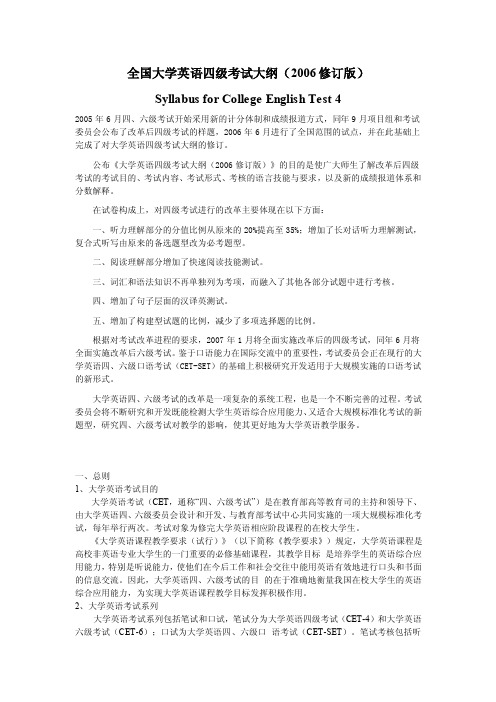
全国大学英语四级考试大纲(2006修订版)Syllabus for College English Test 42005年6月四、六级考试开始采用新的计分体制和成绩报道方式,同年9月项目组和考试委员会公布了改革后四级考试的样题,2006年6月进行了全国范围的试点,并在此基础上完成了对大学英语四级考试大纲的修订。
公布《大学英语四级考试大纲(2006修订版)》的目的是使广大师生了解改革后四级考试的考试目的、考试内容、考试形式、考核的语言技能与要求,以及新的成绩报道体系和分数解释。
在试卷构成上,对四级考试进行的改革主要体现在以下方面:一、听力理解部分的分值比例从原来的20%提高至35%;增加了长对话听力理解测试,复合式听写由原来的备选题型改为必考题型。
二、阅读理解部分增加了快速阅读技能测试。
三、词汇和语法知识不再单独列为考项,而融入了其他各部分试题中进行考核。
四、增加了句子层面的汉译英测试。
五、增加了构建型试题的比例,减少了多项选择题的比例。
根据对考试改革进程的要求,2007年1月将全面实施改革后的四级考试,同年6月将全面实施改革后六级考试。
鉴于口语能力在国际交流中的重要性,考试委员会正在现行的大学英语四、六级口语考试(CET-SET)的基础上积极研究开发适用于大规模实施的口语考试的新形式。
大学英语四、六级考试的改革是一项复杂的系统工程,也是一个不断完善的过程。
考试委员会将不断研究和开发既能检测大学生英语综合应用能力、又适合大规模标准化考试的新题型,研究四、六级考试对教学的影响,使其更好地为大学英语教学服务。
一、总则1、大学英语考试目的大学英语考试(CET,通称“四、六级考试”)是在教育部高等教育司的主持和领导下、由大学英语四、六级委员会设计和开发、与教育部考试中心共同实施的一项大规模标准化考试,每年举行两次。
考试对象为修完大学英语相应阶段课程的在校大学生。
《大学英语课程教学要求(试行)》(以下简称《教学要求》)规定,大学英语课程是高校非英语专业大学生的一门重要的必修基础课程,其教学目标是培养学生的英语综合应用能力,特别是听说能力,使他们在今后工作和社会交往中能用英语有效地进行口头和书面的信息交流。
2016专四真题及完整答案
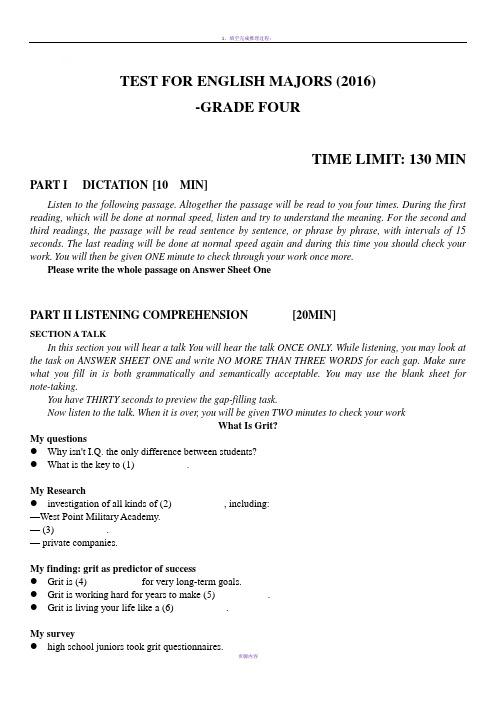
TEST FOR ENGLISH MAJORS (2016)-GRADE FOURTIME LIMIT: 130 MIN PART I DICTATION [10 MIN]Listen to the following passage. Altogether the passage will be read to you four times. During the first reading, which will be done at normal speed, listen and try to understand the meaning. For the second and third readings, the passage will be read sentence by sentence, or phrase by phrase, with intervals of 15 seconds. The last reading will be done at normal speed again and during this time you should check your work. You will then be given ONE minute to check through your work once more.Please write the whole passage on Answer Sheet OnePART II LISTENING COMPREHENSION [20MIN]SECTION A TALKIn this section you will hear a talk You will hear the talk ONCE ONLY. While listening, you may look at the task on ANSWER SHEET ONE and write NO MORE THAN THREE WORDS for each gap. Make sure what you fill in is both grammatically and semantically acceptable. You may use the blank sheet for note-taking.You have THIRTY seconds to preview the gap-filling task.Now listen to the talk. When it is over, you will be given TWO minutes to check your workWhat Is Grit?My questions●Why isn't I.Q. the only difference between students?●What is the key to (1) __________.My Research●investigation of all kinds of (2) __________, including:—West Point Military Academy.— (3) __________.— private companies.My finding: grit as predictor of success●Grit is (4) __________ for very long-term goals.●Grit is working hard for years to make (5) __________.●Grit is living your life like a (6) __________.My survey●high school juniors took grit questionnaires.●(7) __________kids were more likely to graduate.Grit-building●little is known about how to build grit in students.●data show grit is unrelated to (8) __________.●growth mindset is the belief that the ability to learn is (9) __________.●kids with grit believe failure is (10) __________.ConclusionWe need to be gritty about getting our kids grittier.SECTION B CONVERSATIONSIn this section you will hear two conversations. At the end of each conversation, five questions will be asked about what was said. Both the conversation and the questions will be spoken ONCE ONLY. After each question there will be a ten-second pause. During the pause, you should read the four choices of A, B, C and D, and mark the best answer to each question on ANSWER SHEET TWO.You have THIRTY seconds to preview the questions.Now, listen to the conversations.Conversation OneQuestions 1 to 5 are based on Conversation One.1. A. To tell the man that he has been shortlisted for interview.B. To ask the man a few questions about his interview.C. To tell the man the procedure of the interview.D. To explain to the man how to make a presentation.2. A. Questions related to the job.B. General questions about himself.C. Specific questions about his CV.D. Questions about his future plan.3. A. Questions from the interviewers.B. Questions from the interviewee.C. Presentation from the interviewee.D. Requests from the interviewee.4. A. Educational and professional background.B. Problems he has faced and solved.C. Major successes in his career so far.D. Company future and his contribution.5. A. 11 a.m., next Tuesday.B. 11 a.m., next Thursday.C. 9 a.m., this Tuesday.D. 9 a.m., this Thursday.Conversation TwoQuestions 6 to 10 are based on Conversation Two6. A. How college students pay for their education.B. How to handle the problem of college loans.C. The disadvantages of college loans.D. Government financing in college education.7. A. It has increased by 6 to 8 %.B. It has increased by 8 to 10 %.C. It has decreased by 6 to 8%.D. It has decreased by 8 to 10%.8. A. Student's family income.B. First year salary after graduation.C. A fixed amount of 30,000 dollars.D. Payment in the next ten years.9. A. Students can borrow money first.B. Students pay no tax on savings.C. Students pay less tax after graduation.D. Students withdraw without paying tax.10. A. Giving up charitable or volunteer work.B. Neglecting their study at college.C. Giving up further education.D. Neglecting high salary in job-seeking.PART III LANGUAGE USAGE [10 MIN]There are twenty sentences in this section. Beneath each sentence there are four words or phrases marked A, B, C and D. Choose one word or phrase that best completes the sentence. Mark your answers on ANSWER SHEET TWO.11. How can I concentrate if you ___________ continually ___________ me with silly questions?A. have... interruptedB. had...interruptedC. are...interruptingD. were...interrupting12. Among the four sentences below, Sentence ___________ expresses the highest degree of possibility.A. It may take a long time to find a solution to the problem.B. It might take a long time to find a solution to the problem.C. It could take a long time to find a solution to the problem.D. It should take a long time to find a solution to the problem.13. She is a better speaker than___________in the class.A. all the girlsB. the other boysC. other any girlD. any boy14. Nobody heard him sing,___________.A. did theyB. did heC. didn't theyD. did one15. I can't put up with___________.A. that friend of youB. that friend of yoursC. the friend of youD. the friend of yours16. There has been an increasing number of ___________ in primary schools in the past few years.A. man teacherB. men teacherC. man teachersD. men teachers17. This is one of the issues that deserve___________.A. mentioningB. being mentionedC. to mentionD. for mention18. The audience ___________ excited on seeing ___________favorite star glide onto the stage.A. were ... itsB. were...theirC. was...theirD. was...one's19. ___________your advice, I would have made the wrong decision.A. Hadn't it been forB. Had it not been forC. Had it been forD. Had not it been for20. The sentence I wish I had been more careful in spending money expresses the speaker's_____.A. hopeB. joyC. regretD. relief21. The Attorney General ordered a federal autopsy of Brown's body, seeking to___________ the family and community there would be a thorough investigation into hisdeath.A. ensureB. assureC. insureD. ascertain22. The police department came under strong criticism for both the death of an unarmed man andits handling of the___________.A. consequenceB. outcomeC. resultD. aftermath23. The Foreign Secretary tried to ___________ doubts about his handling of the crisis.A. dispelB. expelC. repelD. quell24. Mutual funds are thus best for investors who don't want to take the time to study stocks in detail or who ___________ the resources to build a portfolio.A. depriveB. lackC. yearnD. attain25. Chris ran ___________ John at a sporting-goods trade show and the two quickly struck ___________an easy rapport.A. into...upB. on...intoC. across...onD. against...into26. "I am leaving the country soon," he told a ___________ convened group of reporters.A. especiallyB. particularlyC. speciallyD. specifically27. Israel and Hamas had reached a deal on extending the _______ ceasefire by an extra 24 hours until Tuesday at midnight.A. contemporaryB. makeshiftC. spontaneousD. temporary28. ___________to unplugging the alarm clock and trusting your ability to wake on time on your own, you should probably ease yourself into the new arrangement by keeping a very regular schedule for several weeks.A. DueB. PriorC. RelatedD. Thanks29. If you are an athlete, strong abdominal muscles help you ensure a strong back and freedom from injury during ___________ upper-body movement.A. valiantB. variableC. vigorousD. vigilant30. Finning is a cruel ___________ in which the shark's fins are lopped off, and the live shark is thrown back to sea.A. realityB. truthC. skillD. practicePART IV CLOZE [10 MIN]Decide which of the words given in the box below would best complete the passage if inserted in the corresponding blank. The words can be used ONCE ONLY. Mark the letter for each word on ANSWER SHEET TWO.magine a world without writing. Obviously there would be no books: no novels, noencyclopedias, no cookbooks, no textbooks, no telephone books, no scriptures, no diaries,no travel guides. There would be no ball-points, no typewriters, no computers, no Internet, no magazines, no movie credits, no shopping lists, no newspapers, no tax returns. But such___________(31) of objects almost miss the point. The world we live in has been indelibly marked by the written word, ___________ (32) by the technology of writing over thousands of years. Ancient kings proclaimed their authority and ___________ (33) their laws in writing. Scribes administered great empires by writing, their knowledge of recording and retrieving information essential to governing complex societies. Religious traditions were passed on through ___________ (34), and spread to others, in writing. Scientific and technological progress was achieved and___________(35) through writing. Accounts in trade and commerce could be kept because of writing. Nearly every step of civilization has been mediated through writing. A world without writing would bear ___________(36) resemblance to the one we now live in. Writing is a___________ (37) necessity to the societies anthropologists call civilizations. A civilization is distinguished from other societies by the complexity of its social organization, by its construction of cities and large public buildings, and by the economic specialization of its members, many of whom are not___________(38) involved in food procurement or production. A civilization, with its taxation and tribute systems, its trade, and its public works, requires a ___________ (39) system of record keeping. And so the early civilizations of Egypt, China, and (probably) India all developed a system of writing. Only the Peruvian civilization of the Incas and their predecessors did not use writing but___________ (40) invented a system of keeping records on knotted color-coded strings known as quipu.PART V READING COMPREHENSION [35 MIN]SECTION A MULTIPLE CHOICE QUESTIONSIn this section there are three passages followed by ten multiple choice questions. For each multiple choice question, there are four suggested answers marked A, B, C and D. Choose the one that you think is the best answer and mark your answers on ANSWER SHEET TWO.PASSAGE ONE(1)When I was twenty-seven years old, I was a mining-broker's clerk in San Francisco, and an expert in all the details of stock traffic. I was alone in the world, and had nothing to depend upon but my wits and a clean reputation; but these were setting my feet in the road to eventual fortune, and I was content with the prospect. My time was my own after the afternoon board, Saturdays, and I was accustomed to putting it in on a little sail-boat on the bay. One day I ventured too far, and was carried out to sea. Just at nightfall, when hope was about gone, I was picked up by a small ship which was bound for London. It was a long and stormy voyage, and they made me work my passage without pay, as a common sailor. When I stepped ashore in London my clothes were ragged and shabby, and I had only a dollar in my pocket. This money fed and sheltered me twenty-four hours. During the next twenty-four I went without food and shelter.(2)About ten o'clock on the following morning, dirty and hungry, I was dragging myself along Portland Place, when a child that was passing, towed by a nurse-maid, tossed a big pear -minus one bite - into the gutter. I stopped, of course, and fastened my desiring eye on that muddy treasure. My mouth watered for it, my stomach craved it, my whole being, begged for it. But every time I made a move to get it some passing eye detected my purpose, and of course I straightened up then, and looked indifferent and pretended that I hadn't been thinking about the pear at all. This same thing kept happening and happening,and I couldn't get the pear.(3)I was just getting desperate enough to brave all the shame, and to seize it, when a window behind me was raised, and a gentleman spoke out of it, saying: "Step in here, please."(4)I was admitted by a man servant, and shown into a sumptuous room where a couple of elderly gentlemen were sitting. They sent away the servant, and made me sit down. They had just finished their breakfast, and the sight of the remains of it almost overpowered me. I could hardly keep my wits together in the presence of that food, but asI was not asked to sample it, I had to bear my trouble as best as I could.(5)Now, something had been happening there a little before, which I did not know anything about until a good many days afterwards, but I will tell you about it now. Those two old brothers had been having a pretty hot argument a couple of days before, and had ended by agreeing to decide it by a bet, which is the English way of settling everything. (6)You will remember that the Bank of England once issued two notes of a million pounds each, to be used for a special purpose connected with some public transaction with a foreign country. For some reason or other only one of these had been used and canceled; the other still lay in the vaults of the Bank. Well, the brothers, chatting along, happened to get to wondering what might be the fate of a perfectly honest and intelligent stranger who should be turned adrift in London without a friend, and with no money but that million-pound bank-note, and no way to account for his being in possession of it. Brother A said he would starve to death; Brother B said he wouldn't. Brother A said he couldn't offer it at a bank or anywhere else, because he would be arrested on the spot. So they went on disputing till Brother B said he would bet twenty thousand pounds that the man wouldlive thirty days, anyway, on that million, and keep out of jail, too. Brother A took him up. Brother B went down to the Bank and bought that note. Then he dictated a letter, which one of his clerks wrote out in a beautiful round hand, and then the two brothers sat at the window a whole day watching for the right man to give it to.(7)I finally became the pick of them.41. In Para. 1, the phrase "set my feet" probably means___________.A. put me asideB. start my journeyC. prepare meD. let me walk42. It can be concluded from Para. 2 that___________.A. the man wanted to maintain dignity though starvedB. the man could not get a proper chance to eat the pearC. the man did not really want the pear since it was dirtyD. it was very difficult for the man to get the pear43. Compared with Brother A, Brother B was more ___________ towards the effect of the one-million-pound bank-note on a total stranger.A. neutralB. negativeC. reservedD. positivePASSAGE TWO(1)The concept of peace is a very important one in cultures all over the world. Think about how we greet people. In some languages, the phrases for greetings contain the word for peace. In some cultures we greet people by shaking hands or with another gesture to show that we are not carrying weapons—that we come in peace. And there are certain symbols which people in very different cultures recognize as representing peace. Let's look at a few of them.The dove(2)The dove has been a symbol of peace and innocence for thousands of years in many different cultures. In ancient Greek mythology it was a symbol of love and the renewal of life. In ancient Japan a dove carrying a sword symbolized the end of war.(3)There was a tradition in Europe that if a dove flew around a house where someone was dying then their soul would be at peace. And there are legends which say that the devil can turn himself into any bird except for a dove. In Christian art, the dove was used to symbolize the Holy Ghost and was often painted above Christ's head.(4)But it was Pablo Picasso who made the dove a modern symbol of peace when he used it on a poster for the World Peace Congress in 1949.The rainbow(5)The rainbow is another ancient and universal symbol, often representing the connection between human beings and their gods. In Greek mythology it was associated with Iris, the goddess who brought messages from the gods on Mount Olympus. In Scandinavian mythology the rainbow was a bridge between the gods and the earth. In the Bible a rainbow showed Noah that the Biblical flood was finally over, and that God had forgiven his people. In the Chinese tradition, the rainbow is a common symbol for marriagebecause the colours represent the union of yin and yang. Nowadays the rainbow is used by many popular movements for peace and the environment, representing the possibility of a better world in the future and promising sunshine after the rain.Mistletoe(6)This plant was sacred in many cultures, generally representing peace and love. Most people know of the tradition of kissing under the mistletoe at Christmas time, which probably comes from Scandinavian mythology. The goddess Freya's son was killed by an arrow made of mistletoe, so, in honour of him, she declared that it would always be a symbol of peace. It was often hung in doorways as a sign of friendship.(7)The ancient Druids believed that hanging mistletoe in your doorway protected you from evil spirits. Tribes would stop fighting for a period of time if they found a tree with mistletoe. But you will never see mistletoe in a Christian church - it is banned because of its associations with pagan religion and superstition.The olive branch(8)The olive tree has always been a valuable source of food and oil. In Greek mythology, the goddess Athena gave the olive tree to the people of Athens, who showed their gratitude by naming the city after her. But no one knows for sure when or why it began to symbolize peace. There is probably a connection with ancient Greece. Wars between states were suspended during the Olympic Games, and the winners were given crowns of olive branches. The symbolism may come from the fact that the olive tree takes a long time to produce fruit, so olives could only be cultivated successfully in long periods of peace. Whatever the history, the olive branch is a part of many modern flags symbolizing peace and unity. One well-known example is the United Nations symbol.(9)The ankh is an ancient symbol which was adopted by the hippie movement in the 1960s to represent peace and love. It was found in many Asian cultures, but is generally associated with ancient Egypt. It represented life and immortality. Egyptians were buried with an ankh, so that they could continue to live in the "afterworld". The symbol was also found along the sides of the Nile, which gave life to the people. They believed that the ankh could control the flow of the river and make sure that there was always enough water.44. Which of the following is the best title for the passage?A. Concept of Peace.B. Origin of Peace Symbols.C. Popular Peace Symbols.D. Cultural Difference of Peace.45. The rainbow represents the connection between human beings and their gods in all the following countries EXCEPT___________.A. SwedenB. GreeceC. FinlandD. China46. In North Europe mistletoe was often hung in doorways to indicate___________.A. friendshipB. loveC. kinship47. The origin of the ankh can date back to___________.A. the NileB. the "afterworld"C. the hippie movementD. ancient EgyptPASSAGE THREE(1)Two sides almost never change: That you can manipulate people into self-sufficiency and that you can punish them into good citizenship.(2)The first manifests itself in our tireless search for the magical level at which welfare grants are big enough to meet basic needs but small enough to make low-paid work attractive. The second has us looking to the criminal justice system to cure behavior that is as much as anything the result of despair.(3)The welfare example is well known. We don't want poor people to live in squalor or their children to be malnourished. But we also don't want to subsidize the indolence of people who are too lazy to work. The first impulse leads us to provide housing, food stamps, medical care and a cash stipend for families in need. The second gets us to think about "workforce".(4)We've been thinking about it for two reasons: the "nanny" problems of two high-ranking government officials (who hired undocumented foreigners as household helpers, presumably because they couldn't find Americans to do the work) and President Clinton's proposal to put a two-year limit on welfare.(5)Maybe something useful will come of Clinton's idea, but I'm not all that hopeful. It looks to me like one more example of trying to manipulate people into taking care of themselves.(6)On the criminal justice side, we hope to make punishment tough enough to discourage crime but not so tough as to clog our prisons with relatively minor offenders. Too short a sentence, we fear, will create contempt for the law. Too long a sentence will take up costly space better used for the violent and unremorseful.(7)Not only can we never find the "perfect" punishment, our search for optimum penalties is complicated by our desire for fairness: to let the punishment fit the crime. The problem is that almost any punishment - even the disgrace of being charged with a crime - is sufficient to deter the middle class, while for members of the underclass, probation may be translated as "I beat it."(8)So how can you use the system - welfare or criminal justice - to produce the behavior we want? The answer, I suspect is: You can't.(9)We keep trying to use welfare and prison to change people - to make them think and behave the way we do - when the truth is the incentives work only for those who already think the way we do: who view today's action with an eye on the future.(10)We will take lowly work (if that is all that's available) because we believe we can make bad jobs work for us. We avoid crime not because we are better people but because we see getting caught as a future-wrecking disaster. We are guided by a belief that good things will happen for us in the future if we take proper care of the present. Even under the worst of circumstances, we believe we are in control of our lives.(11)And we have trouble understanding that not everybody believes as we believe. Thewelfare rolls, the prisons and the mean streets of our cities are full of people who have given up on their future. Without hope for the future, hard work at a low-paid job makes no sense. Working hard in school, or pleasing a boss, or avoiding pregnancy makes no sense. The deadly disease is hopelessness. The lawlessness and poverty are only the obvious symptoms.(12)I'm not advocating that we stop looking for incentives to move poor people toward self-sufficiency or that we stop punishing people for criminal behavior. There will always be some people who need help and some who deserve to be in jail.(13)All I'm saying is that the long-term answer both to welfare and the crime that plagues our communities is not to fine tune the welfare and criminal justice systems but to prevent our children from getting the disease of despair.(14)If we encourage our young people to believe in the future, and give them solid evidence for believing, we'll find both crime and poverty shrinking to manageable proportions.48. What is the author's attitude towards Clinton's proposal to welfare?A. Pessimistic.B. Optimistic.C. Suspicious.D. Sarcastic.49. It can be inferred from Para. 7 that optimum penalties are___________to the underclass.A. uselessB. hopelessC. frighteningD. humiliating50. Which of the following is the most appropriate title for the passage?A. Lawlessness and Poverty.B. Criminal Justice System.C. Welfare Grants.D. Disease of Despair.SECTION B SHORT ANSWER QUESTIONSIn this section there are five short answer questions based on the passages in Section A. Answer the questions with NO more than TEN words in the space provided on ANSWER SHEET TWO.PASSAGE ONE51. In Para. 4, what does the man mean by saying "I had to bear my trouble"?52. What can be inferred from the last sentence of the passage?PASSAGE TWO53. Why does the UN use the olive branch in its symbol?PASSAGE THREE54. According to the author, what balance should we keep in welfare?55. What does the author mean by saying "Even under the worst of circumstances, we believe we are in control of our lives" (Para. 10)?PART VI WRITING [45 MIN]Read carefully the following excerpt on term-time holiday arguments in the UK, and then write your response in NO LESS THAN 200 words, in which you should:●summarize the main message of the excerpt, and then●comment on whether parents should take children out of school for holiday duringterm time in order to save money.You should support yourself with information from the excerpt.Marks will be awarded for content relevance, content sufficiency, organization and language quality. Failure to follow the above instructions may result in a loss of marks.EE.-THE END---2016年英语专业四级考试参考答案Part I DICTATIONThink Positive and Feel PositiveAre you confident or insecure in a difficult situation? / Do you react positively or negativ ely? / The answer may depend in part on whom you’re around. / A study found that negative thinking can be contagious in some cases. / For example, the researchers studied 103 college roommates. / They measured each roommate’s tendency towards negative thinking. / It was f ound that thinking patterns can be contagious. / Students with a negative thinking roommate became more depressed themselves, / and students with more positive thinking roommates / were more likely to become more positive as well.Part II LISTENING COMPREHENSIONSECTION A TALK 1. success2. challenging settings3. National Spelling Contest4. passion and perseverance5. future a reality6. marathon7. gri ttier8. measures of talent 9. not fixed / changeable 10. a temporary conditionSECTION B CONVERSATIONS 1.Why does the woman call the man?答案:[D] To tell the man the procedure of the interview. 2.What kind of questions can the man ask in the interview? 答案:[A] Questions related to the job. 3.Which is the last part of the interview?答案:[C]Presentation from the interviewee.4. What might be expected from the man’s presentation? 答案:[D]Company future and his contribution.5. When is the interview scheduled? 答案:[B]11 a.m. next Thursday.6.What is the interview mainly about?答案:[C] How to handle the problem of college loans. 7.How does the cost of college educatio n change every year?答案:[A]It was increased by 6 to 8%.8.What is used to measure student loan debt as a guideline? 答案:[B]First year salary after graduation.9.What is the advantage of joining a college savings plan? 答案:[D]Students withdraw without paying tax. 10.What is the possible social cost of a college loan? 答案:[A]Giving up charitable or volunteer work.。
2016年英语专业四级TEM-4真题及解析
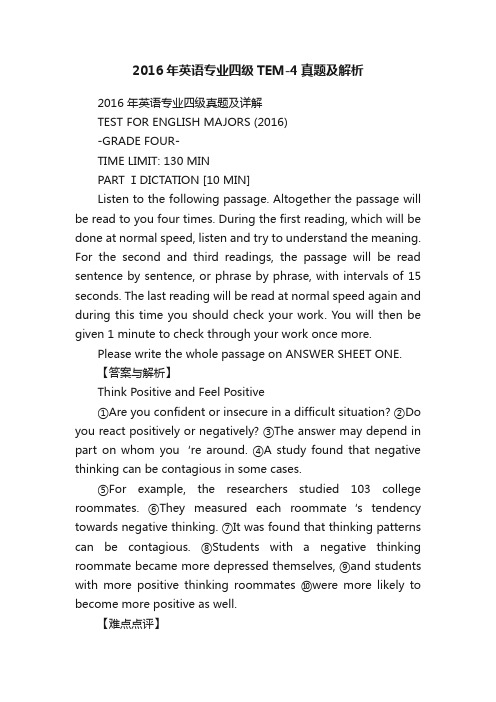
2016年英语专业四级TEM-4真题及解析2016 年英语专业四级真题及详解TEST FOR ENGLISH MAJORS (2016)-GRADE FOUR-TIME LIMIT: 130 MINPART ⅠDICTATION [10 MIN]Listen to the following passage. Altogether the passage will be read to you four times. During the first reading, which will be done at normal speed, listen and try to understand the meaning. For the second and third readings, the passage will be read sentence by sentence, or phrase by phrase, with intervals of 15 seconds. The last reading will be read at normal speed again and during this time you should check your work. You will then be given 1 minute to check through your work once more.Please write the whole passage on ANSWER SHEET ONE.【答案与解析】Think Positive and Feel Positive①Are you confident or insecure in a difficult situation? ②Do you react positively or negatively? ③The answer may depend in part on whom you‘re around. ④A study found that negative thinking can be contagious in some cases.⑤For example,the researchers studied 103 college roommates. ⑥They measured each roommate‘s tendency towards negative thinking. ⑦It was found that thinking patterns can be contagious. ⑧Students with a negative thinking roommate became more depressed themselves, ⑨and st udents with more positive thinking roommates ⑩were more likely to become more positive as well.【难点点评】(1)句①中,注意“insecure”的拼写,同时注意本句为一个一般疑问句,所以需以问号结尾。
2016专四真题试卷
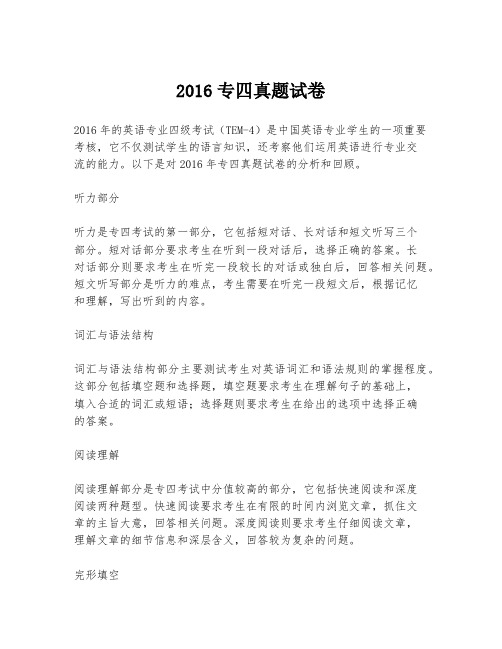
2016专四真题试卷2016年的英语专业四级考试(TEM-4)是中国英语专业学生的一项重要考核,它不仅测试学生的语言知识,还考察他们运用英语进行专业交流的能力。
以下是对2016年专四真题试卷的分析和回顾。
听力部分听力是专四考试的第一部分,它包括短对话、长对话和短文听写三个部分。
短对话部分要求考生在听到一段对话后,选择正确的答案。
长对话部分则要求考生在听完一段较长的对话或独白后,回答相关问题。
短文听写部分是听力的难点,考生需要在听完一段短文后,根据记忆和理解,写出听到的内容。
词汇与语法结构词汇与语法结构部分主要测试考生对英语词汇和语法规则的掌握程度。
这部分包括填空题和选择题,填空题要求考生在理解句子的基础上,填入合适的词汇或短语;选择题则要求考生在给出的选项中选择正确的答案。
阅读理解阅读理解部分是专四考试中分值较高的部分,它包括快速阅读和深度阅读两种题型。
快速阅读要求考生在有限的时间内浏览文章,抓住文章的主旨大意,回答相关问题。
深度阅读则要求考生仔细阅读文章,理解文章的细节信息和深层含义,回答较为复杂的问题。
完形填空完形填空是英语考试中常见的一种题型,它要求考生在理解文章大意的基础上,从给出的选项中选择最合适的词汇填入空白处,使文章通顺、意义完整。
这部分考察考生的词汇运用能力和对上下文的理解能力。
翻译翻译部分包括英译汉和汉译英两种题型,要求考生将给定的英文或中文材料翻译成另一种语言。
这部分不仅考察考生的语言转换能力,还考察他们对文化差异的理解和表达能力。
写作写作部分是专四考试的最后一部分,通常要求考生根据给定的题目或材料写一篇文章。
这部分考察考生的英语写作能力,包括语言的准确性、逻辑性、连贯性和创造性。
试卷结构2016年专四真题试卷的结构如下:- 听力部分:约30分钟- 词汇与语法结构:约15分钟- 阅读理解:约45分钟- 完形填空:约15分钟- 翻译:约30分钟- 写作:约45分钟备考建议为了在专四考试中取得好成绩,考生应该:1. 系统复习英语基础知识,包括词汇、语法和句型结构。
英语专业四级考试 TEM4(2016)评分标准
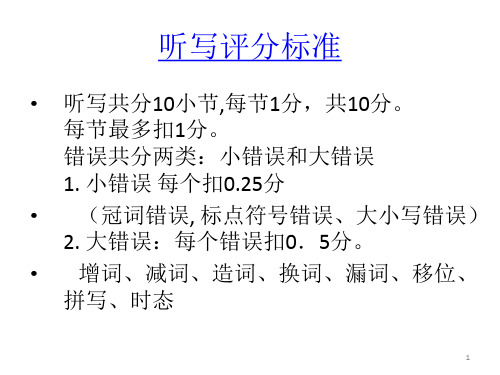
4
写作
语言运用能力
1. 词汇运用准确,丰富,运用自然 2. 语法正确,句式丰富多样,自然 3. 拼写、大小写正确 4. 标点符号使用准确,卷面整洁
5
准确表达材料主题; 准确表述材料中心内容; 全 面准确抓住材料要点; 准确描述材料间关系
• 讨论部分
讨论切题,中心明确; 观点明确,有些新意; 要点陈述清晰; 能针对原文观点展开讨论; 论据 充分有力; 论据种类丰富; 结论自然完整
3
写作
篇章组织能力 3分 1. 缩写和讨论两部分顺序安排合理 2. 缩写和讨论部分内部结构完整 3. 缩写部分两份材料直接过渡自然 4. 讨论部分要点明确 5. 讨论部分要点顺序合理 6. 段落划分合理
听写评分标准
• 听写共分10小节,每节1分,共10分。 每节最多扣1分。 错误共分两类:小错误和大错误 1. 小错误 每个扣0.25分
• (冠词错误, 标点符号错误、大小写错误) 2. 大错误:每个错误扣0.5分。
• 增词、减词、造词、换词、漏词、移位、 拼写、时态
1
专四简答题评分原则
• 1. 评分侧重点不是阅读理解,不是写作,故评分点 是关键词或词组是否正确。
公共英语四级新大纲题型变化解读
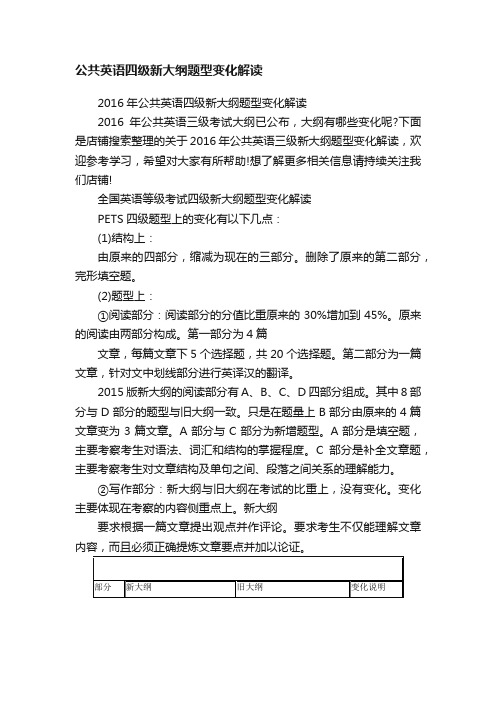
公共英语四级新大纲题型变化解读2016年公共英语四级新大纲题型变化解读2016年公共英语三级考试大纲已公布,大纲有哪些变化呢?下面是店铺搜索整理的关于2016年公共英语三级新大纲题型变化解读,欢迎参考学习,希望对大家有所帮助!想了解更多相关信息请持续关注我们店铺!全国英语等级考试四级新大纲题型变化解读PETS四级题型上的变化有以下几点:(1)结构上:由原来的四部分,缩减为现在的三部分。
删除了原来的第二部分,完形填空题。
(2)题型上:①阅读部分:阅读部分的分值比重原来的30%增加到45%。
原来的阅读由两部分构成。
第一部分为4篇文章,每篇文章下5个选择题,共20个选择题。
第二部分为一篇文章,针对文中划线部分进行英译汉的翻译。
2015版新大纲的阅读部分有A、B、C、D四部分组成。
其中8部分与D部分的题型与旧大纲一致。
只是在题量上B部分由原来的4篇文章变为3篇文章。
A部分与C部分为新增题型。
A部分是填空题,主要考察考生对语法、词汇和结构的掌握程度。
C部分是补全文章题,主要考察考生对文章结构及单句之间、段落之间关系的理解能力。
②写作部分:新大纲与旧大纲在考试的比重上,没有变化。
变化主要体现在考察的内容侧重点上。
新大纲要求根据一篇文章提出观点并作评论。
要求考生不仅能理解文章内容,而且必须正确提炼文章要点并加以论证。
【拓展阅读】全国英语等级考试PETS四级考试点PETS第四级考生应能掌握5500左右的词汇以及相关附表中的内容。
在制定第四级词汇表时,除参照了国内外同层次教学中所用的词表,也参考了一些大型英语语料库的词频列表。
同时,还考虑到了该级别考生在交际中的实际需要。
第四级词汇表在包括了第三级词汇表中全部词汇的基础上增力1500词。
第四级词汇表仅包含单词的`基本词形,不包括单词的读音、词性、意义和用法,考生应学习和掌握这些内容。
考生还应掌握基本的英语构词法,能够根据“词汇表附表五:词缀表”中的词缀进行单词的派生。
